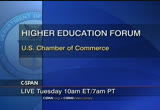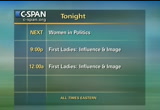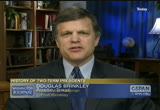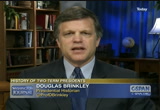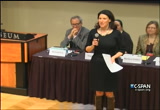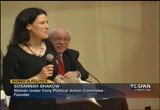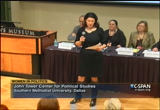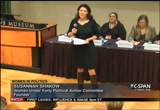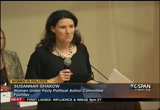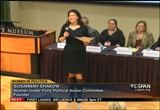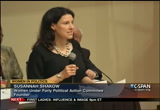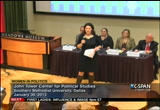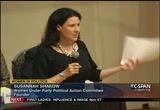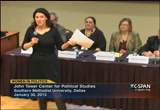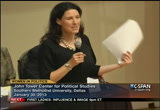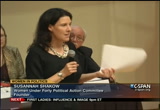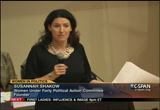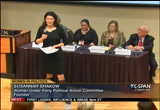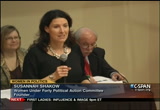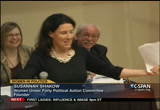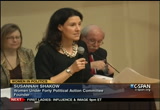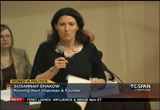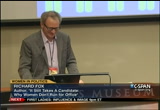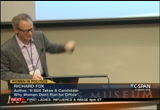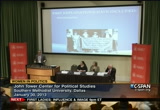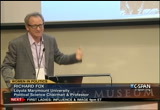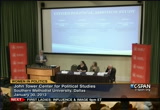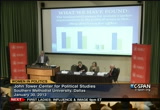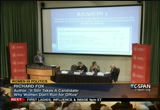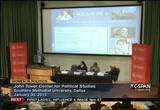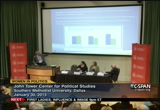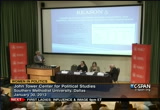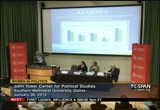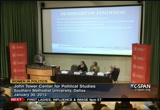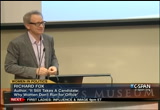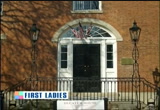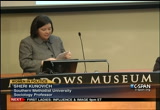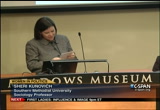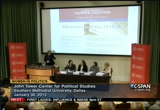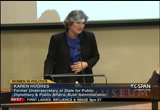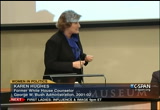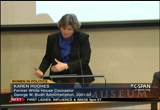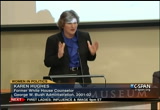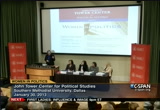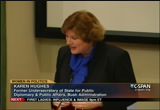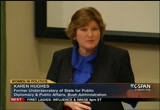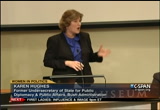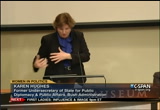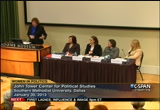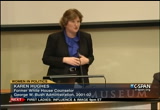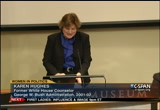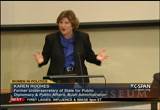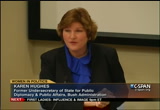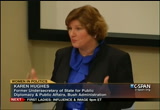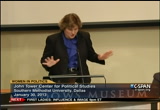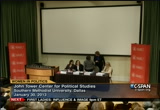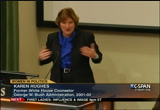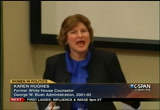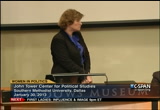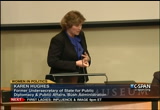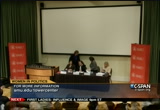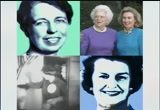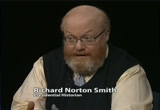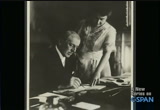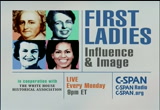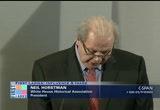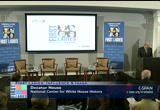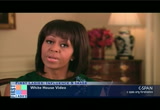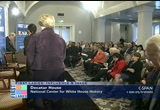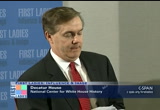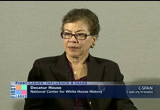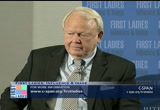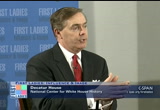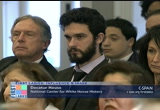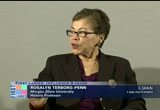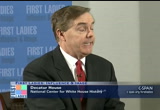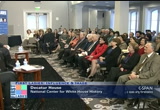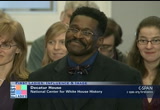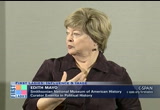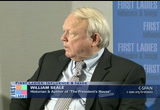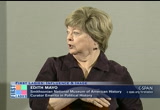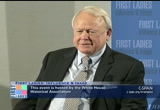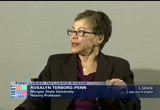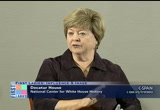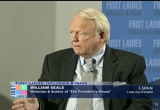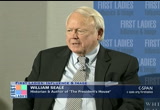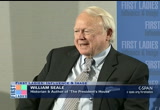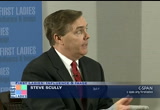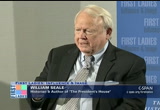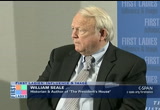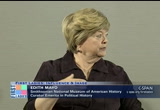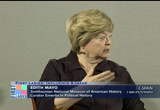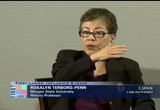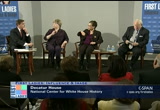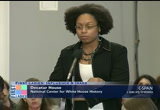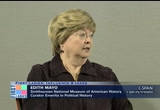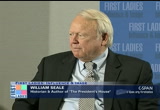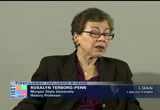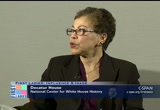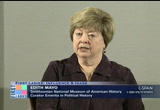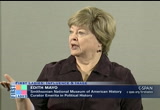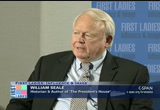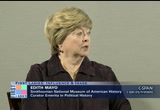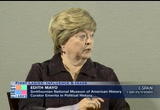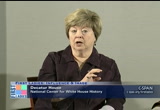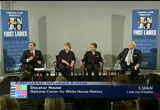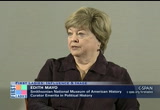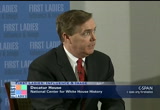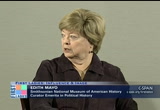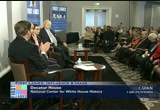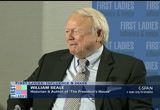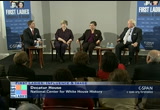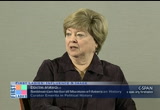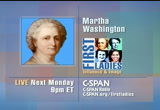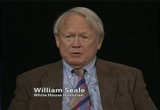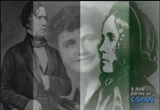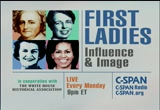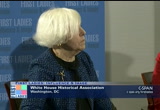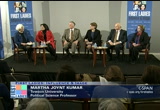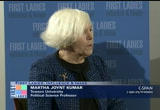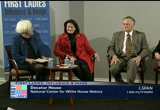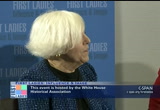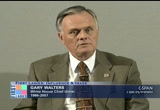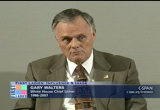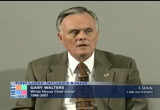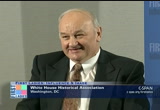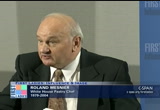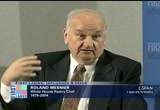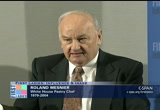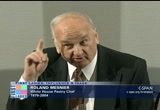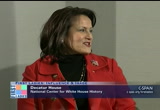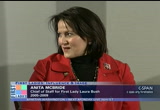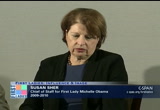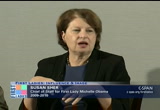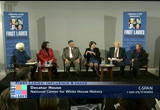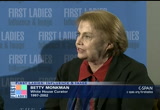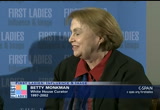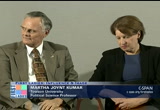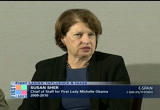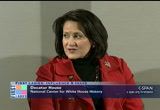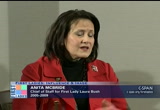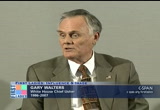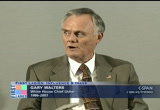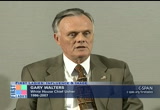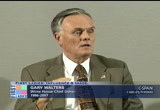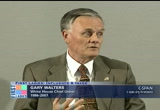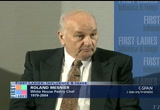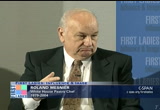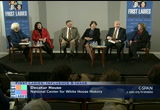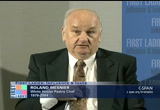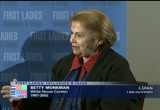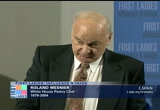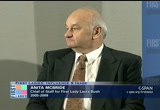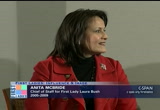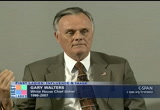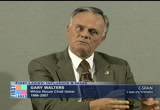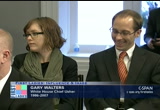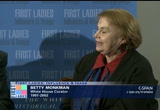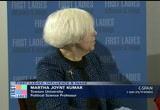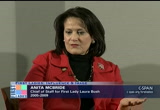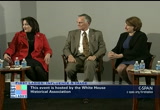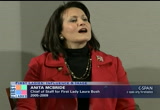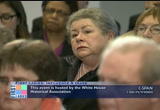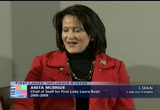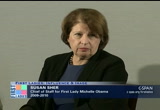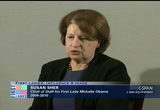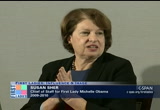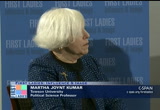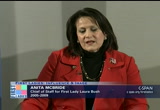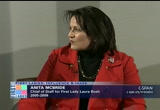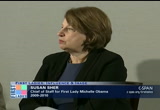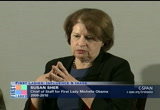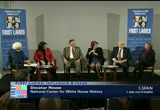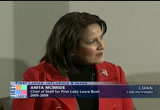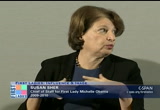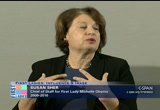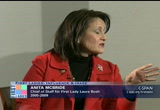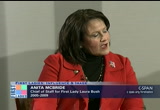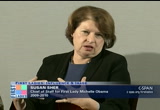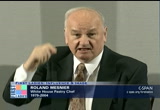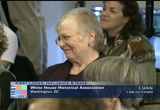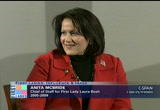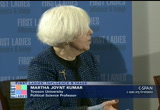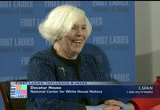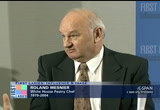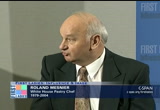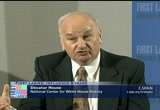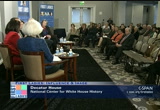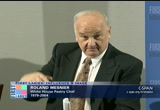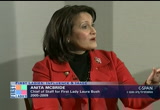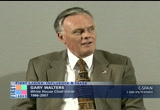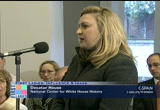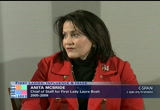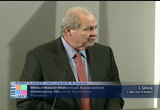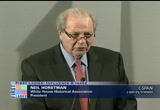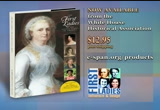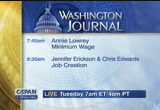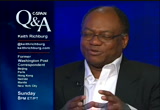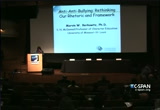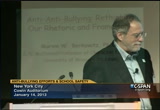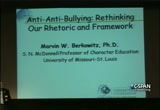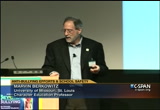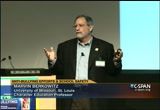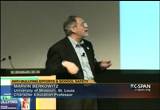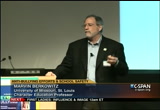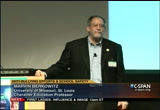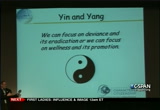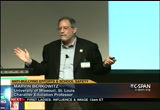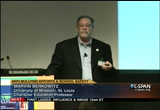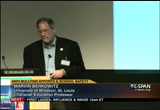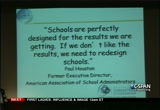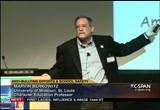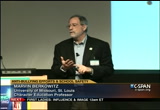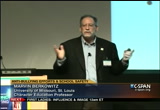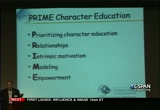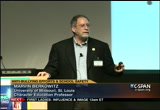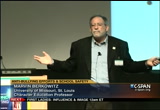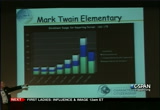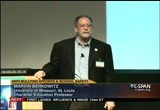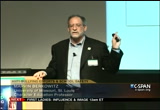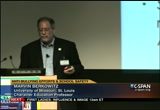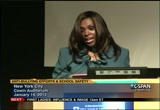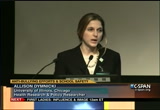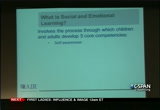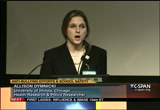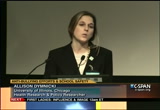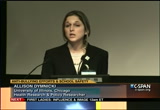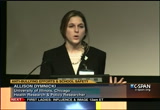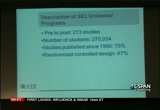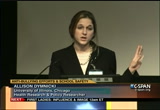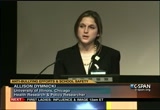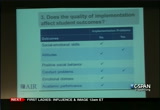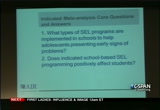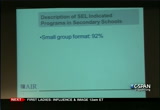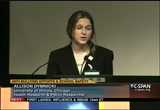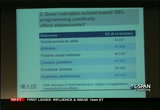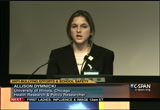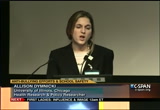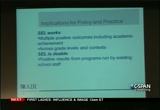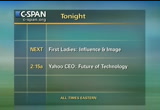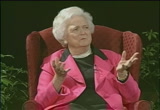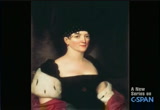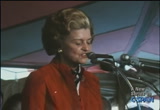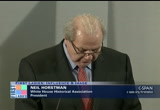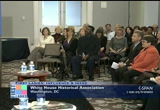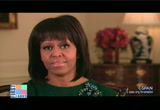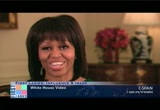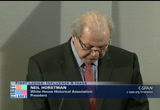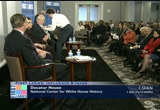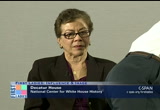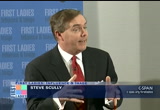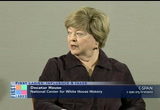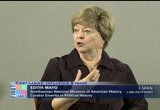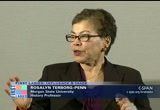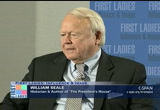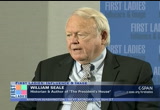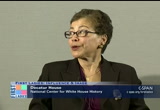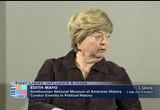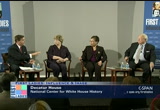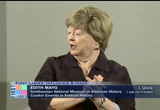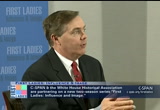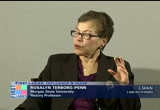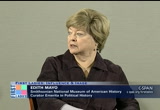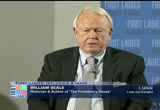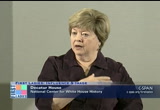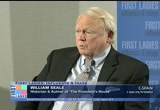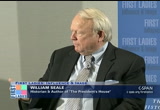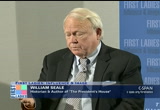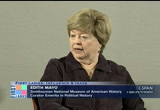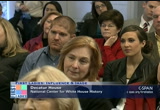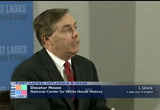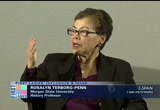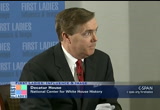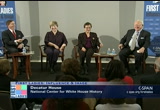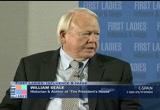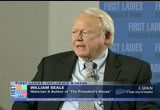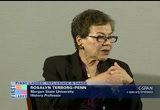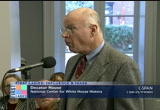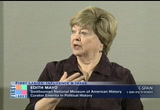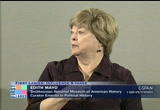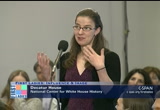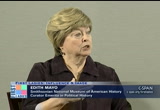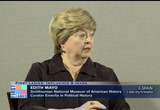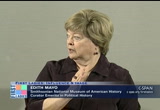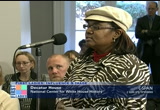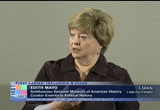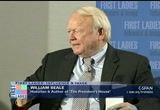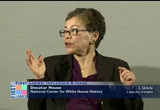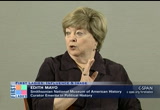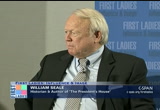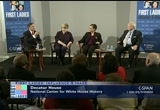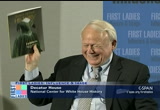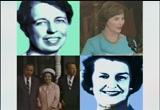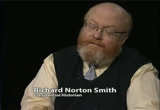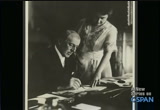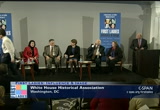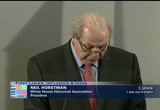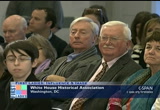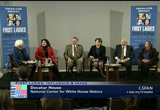tv Politics Public Policy Today CSPAN February 18, 2013 8:00pm-1:00am EST
8:00 pm
in higher education from the u.s. chamber of commerce in washington. among the speakers, margaret spellings, educational secretary and george w. bush's second term. coming up in a couple minutes, a discussion on women and politics. tonight our new series, first ladies, influence and image with historians secret staff, chefs and curators, from martha washington to michelle obama. season 1 begins tonight at 9:00 eastern and pacific. on c-span, c-span radio and c-span.org. and you can also watch it again tonight at midnight. on this presidents' day, we talk about historian doug brinkley on the second terms of presidents. >> douglas brinkley, here is congressional quarterlies weekly and they have a graphic
8:01 pm
here. second terms tend to be more difficult. why is that? give us the history. >> well, i don't know if i totally believe that. and i know it's so popular right now that i hate to be the contrarian where we're saying second terms are a curse and that they're so much more difficult. i think any president would rather be in their second term than having to be in a first term with a huge election looming. so i think you get a lot of relief when you're president in the second term that you don't have to run again. also, there's a notion there are scandals that occur in the second term on nixon and watergate and iran-contra and lewinsky problems, all ones people raise. what they miss, is what would bill clinton have been without a second term. it wasn't the lewinsky issue that matters in the end but when he left office we had a surplus and that the
8:02 pm
triangulation worked and was able to have a balanced budget and couldn't have done it without a second term. we don't dwell on ronald reagan's iran-contra debacle. the fact of the matter is reagan's great diplomacy with mikhail gorbachev, margaret thatcher said reagan won the cold war without firing a single shot and occurred because reagan is taking the trips and meeting with gorbachev to end the cold war. but the point i'm making is this notion of the division of first and second terms and all the polls we see is a little bit overwrought. if second terms were so bad, f.d.r. woopt have had a third or fourth there is truth you lose some of your l.s.u.er in the sense barack obama won't run again and people realize his power is limited, his clock is running so it's sometimes harder to do legislative deals
8:03 pm
in the second term, on the other hand, barack obama can sign executive order after executive order and he will and you'd be amazed how many second orders get signed on a president's way out of office. >> washington journal airs every day at 7:00 eastern. now a discussion on women and politics. this part of the conference held at southern methodist university in dallas with some of the challenges facing women candidates. this is 30 minutes. >> thank you so much for having me today. the weather in d.c., i thought i was getting a break coming to dallas and unfortunately had to wear my coat this morning. so what i'm here to talk to you all about is why we need more women in politics but this weekend i was looking on the internet and found what i think is a much better title for this talk and that is ask not what you can do for women, but what women can do for you.
8:04 pm
so a few years ago i found myself sitting next to the mayor of salt lake city and he was a nice guy and we started talking about what i do for a living and i told him i work to encourage young women and girls to run for a political office. why, he said? which stumps me because in my world, the question of why we need more women, is not a question but how do we get more women there. he went on to say i have two daughters, i have a wife, i have a more, he said, i know what women need and what can women do in office that i can't do? and it was an interesting question and he had no idea what a can of worms he was opening by getting into this conversation with me because i really believe no matter how well intentioned a man in office is, his decisions are never going to be as strong if you have men and women legislating together.
8:05 pm
i'm happy to say in the years i started doing this work is the world has come around to this idea, the idea is we need to add women to leadership, not because it's fair or it's the right thing to do but because adding more women to leadership is going to make stronger decisions and a better world for all of us. so when i talk to groups, they say how do you know it's good to add women to politics, the best news comes from the business world and there are two studies that came out a few years ago, one from catalyst and one from mckenzie which i think is relevant and exciting when we talk about why we need more women in politics. and i'm going to read it so you don't miss the nuance. what catalyst found is fortune 500 companies with three or more women on the board gain a significant performance advantage over those with the fewest and actually found there were 73% return on sales, 83%
8:06 pm
return on equity and 112% return on invested capital. that's huge. add women, make more money. mckenzie found companies with the highest percentage of women showed the best performance. that's simple, add more women to the top of committees and make more money. this research has been taken so seriously when i was in bulge up recently speaking to the people in the european parliament, i learned how they are talking about mandating having 40% women on every corporate board which is huge and this research could change the way business is done. so the question is, would this also hold true for politics? of course it would hold true for politics because adding women to corporate boards is not that women have some magic money making ability but they
8:07 pm
add diversity and diversity is the key. i want to read you something again. there was a report by ernst & young and said that researchers demonstrated the groups with greater diversity tend to perform better than homogenius ones even if, and this is a key thing to me, even if the homogenius groups are more capable. think about that. that is fascinating especially because i think we'll never have quotas in the u.s. but people say you can't have quotas because you don't get the best women in, this ernst & young report says if you have diversity, that group will outperform even people who are smarter and more capable on paper. so diversity absolutely matters if you want the best results. and so i speak to a lot of groups of very young women and what i always ask them is what do you think? do we have diversity in politics in america. and i'm telling you, maybe it is not a surprise, they say
8:08 pm
yes, of course we do. we have hillary clinton. she ran for president and is secretary of state and we see her in the news every day and we have sarah palin was all over the place, michele bachmann. these are big names. we had nancy pelosi running the house. we had record gains in the senate this year. everybody is talking about how this is an incredible, exciting election because now we have 20 senators. , the most we ever had. we have an entire state with a all female delegation which is new hampshire. women are everywhere on politics. that is what most people think and everyone in this room knows that's not the slightest bit true. in fact, women hold 18% of the seats in congress. in the state legislatures, we've been stuck at around 23% forever. there's no movement.
8:09 pm
we used to have nine governors but have five governors who are women. we have five governors who are women. and that places the u.s. at about 95th in the world in terms of our female political representation. and that's another one i'll ask young students. where do you think we rank in the world and i ask this to domestic groups and speaking abroad. where do you think the u.s. ranks? it is uniformly, the u.s. students say well, we're number one, aren't we? and many of the international students think the same even when their countries are much, much higher. so secretary clinton has said frequently in the past couple years, the unf.b.i.ed -- unfinished business in 21 years is the empowerment of women and girls. it's really huge she's saying that and really drawing the world's attention to the fact
8:10 pm
that the leadership of the world today, we're using half of our brainpower. and that's true if you look at politics and business and law and academia, we're using half of our talent pool right now. adding more women to leadership is not about what's right, it's about what's best for everybody. which brings us back to running start. my organization. and i want to tell you a little bit about the work that i do to get more women into leadership. and the reason i want to tell you about it is running start, we have a very unique approach to this age old problem. 12 years ago i was working in a law firm and i was running a political action committee on the side and jim told you the number of it is women under 40 political action committee but is known as wolfpack and professor palmer was on the board and we tried for years and years to change this name and sat with me in many hours in conferences thinking of
8:11 pm
alternative names and we never got anywhere, unfortunately. the mission of the p.a.c. is to elect women under 40 to congress. in that demographic, women under 40 running for congress that is an incredibly atypical candidate. these women were not old. they were not male and many times were not white. if you look at our congress, that's what you see. because they were not our typical candidates, they had trouble getting traditional donor support so they loved wolfpack because we often were the very first people to give them a check. we were the very first people to say you know what, i believe you in as a candidate. i think you can do this. it turns out they were incredibly great candidates to back. so while other people saw women with long hair and maybe high heels who looked like their granddaughters, we saw a political candidate and we often were really right at how great these women were going to be.
8:12 pm
so in the 12 years wolfpack has been around we elected some of the big names in congress, debbie wassermann schultz, she started out at age 333. i met her when she first started campaigning and was astouned, actually, because she was making the rounds in d.c. talking to p.a.c.'s, trying to get money and establish herself as a viable candidate and the meetings she went to, she had her newborn baby with her which i just loved and she had the baby with her because she was breast-feeding and lived in florida and this to bring this baby with her and she couldn't live it at home. kathy mcmorris rodgers is a republican young woman from washington state. we helped elect her, and i forget when, a while ago, she was 33 and chosen as one of the top picks for a g.o.p. leadership so she's going places. senator kirsten gillibrand who
8:13 pm
people talk about as a viable presidential candidate in the future and gabrielle giffords who everyone knows and this year we helped elect kelsey gabbert who will be an absolute superstar and has been in office a couple weeks and has been elected vice chair of the d.n.c. and she has so many firsts she brings to congress. she's a hindu, she's a service member and very young. she's been in politics since 2 1. wolfpack has these great nontraditional candidates and bring diversity of gender and different things to congress. but wolfpac had a problem and i'll tell you what this problem is. i left the law firm and ran wolfpac for five years and the problem with wolfpac is we had all the money in the world and used to joke if oprah were to come in and say look, i love you and i'm going to give you a
8:14 pm
million dollars and if we had an enormous staff, we literally would not have had candidates to give the money to which is a crazy problem. and it's because the number of women under 40 and we're bipartisan, the number of women under 40 who run for congress is teenie tiny. some p.a.c.'s have 50 great candidates and on really good years we'd have five great candidates. so in 2007 to alleviate this problem i split the board of wolfpac in half and half of them continued to run wolfpac and are doing a wonderful job and the rest of us came to running start and the idea behind running start is we wanted to grow this pipeline of young women who were going to become candidates because nobody really was talking to young women about running for office. and we decided with running start to not work with candidates which most groups are trying to get women in politics, they work with candidates and you help them get elected.
8:15 pm
we decided to not just work with candidates but not work with women and started with girls. people thought we were absolutely crazy because we started with high school girls, some of them were 14, so if you do the math that's a lot of years until you can run for congress. running start is a very, very long game. the reason we did it is because it has to do with dr. fox and jennifer lawless. he does research -- i don't care mention it because you have the expert here. but his research said women don't feel as qualified to run for office as men do. and we took that colonel and thought that is horrible news because bewere surrounded by bright, young women and women who have the psalm qualifications as men don't feel qualified to run for office. we need to change that and what we decided to do was to work with women before they had that
8:16 pm
switch go off in their mind and working with women before they knew who they were and work at them that a point you could convince them they do have what it takes and they are qualified. you could give them the skills they need in order to really feel confident about their leadership abilities. and part of it, too, you talk to a high school girl and tell her, look, you see hillary clinton and think how can i be hillary clinton and get up to the top ranks, but it's not rocket science. there's not one magic formula that makes a candidate. it's really all about hard work and learning the skills, so we get these young girls to think of themselves as candidates. we've been around since 2007, running start is still a baby organization and we started with 20 girls in 2007 but as of 2013 we trained 7,000 young women around the country and that's another story about how
8:17 pm
we were able to do so much. the most exciting thing about running start to me is when we started, i knew it was a good idea to train girls, i knew it made sense and that it really could make a real difference in getting more young women in that pipeline and seeing themselves as candidates. i had no idea if i could convince the girls that they wanted to come and get in the program. because the program is rigorous and it makes these girls do things they do not want to do. i'm telling you, public speaking is just excruciating for all of us. being put on camera. we bring in reporters and they interview them on camera. they hate it. being on camera is worse than public speaking. we make them do fundraising, games. but the great news is we started out with 20, i had to twist those arms and the next year they told their friends
8:18 pm
and we had 300 girls apply to the program but one of the things that happened, is after the 2008 election when we had all these amazing people running for office where politics was cool for the first time in oh, so long, we started to accept applications for our define summer program -- for our 2009 summer program after the election and at this time we were working out of my attic because we still didn't have much money and the first week we got 1,000 applications in the mail and we made the stupid mistake of opening applications in november and not closing them until february because we wanted to make sure we got enough people and by february when we closed it, we'd received 30,000 applications. and just to tell you what that was like, the mailman who is used to delivering four things had big trays of mail and finally rang the doorbell and is like, we need to talk, figure out what is going on.
8:19 pm
and the great thing is we really do see results. the girls that come to our program, they write us emails all the time. i have to read you a quick one from this woman, and before attending running start it never occurred me to run for office. i'm more of a behind the scenes person but to my surprise i enjoy politics and the opportunity it gives me to make a difference and i plan to run for office in the near future. that's what we hear. and i was in israel speaking to this group of young women and often will ask young women to raise your hands, please, let me know how many of you all think it would be a good idea if there were more women in politics. they all raised their hand. i never had a group -- i don't think it matters but they all get it and all raised their hand. but then i follow it up, of course, with the question, ok, now raise your hands and tell me who's going to run? which of you are going to run? so in this one group in israel, one girl raised her hand and i asked the other one, why aren't you going to run?
8:20 pm
and the girl said, i'm a behind the scenes person, you know, shelly -- it wasn't shelly in israel, i can't think of an israeli name, but shelly would do a fabulous job and is really good at this stuff but i'll help shelly campaign and she's like oh, no, no, not me. let's talk to barbara over here. she would do a good job. so running start is about changing that and letting these girls feel they have real responsibility to step up and change problems. i know my time is probably up so i will wrap up and say what i want to do is take these girls, the girls who apply to our program are such amazing girls and will bring so much to politics when they do get there because the reason they want to be in politics is not because they want to be powerful people, but want to be in politics because they're coming from communities or schools where they see real problems and don't see anybody doing anything about it so they want
8:21 pm
to learn how to solve the problems and learn what it takes in order to be a changemaker and that's who exactly i want to see in politics. i'm incredibly encouraged every day when i work with these young women that they are stepping out of the sidelines and they are realizing they have the responsibility to get up there and to run. so thank you all. [applause] >> good morning, everyone. i'm afraid after that uplifting presentation, i'm more of the darth vader of women politics research where things are maybe less hopeful. again, thank you so much for inviting me to the tower center. the entitle of -- the tight of my presentation today is why women are not running for office.
8:22 pm
party qualifications, family and recruitment. all right. as i alluded to -- i'm a typical social scientist and will hit you with a whirlwind of statistics, they're easy, all percentages and things and will go over them quickly but ask me more about these later when i see you throughout the day. as alluded to, if you look at the major elected positions in the united states, senate, house, governors, mayors of larger city, men occupy between 75% and 0% of these positions, as alluded to. if you look at the world rankings of the united states, and world rank in terms of percentage of women in our national legislature, or actually 95th, i think, but that's from a month or so ago, we're 95th in the world in terms of women serving in legislatures. there's a big difference between the parties between democrats and republicans. if you quickly look at the u.s. house, this is the current
8:23 pm
configuration of the u.s. house, 31% of democrats in the senate -- i'm sorry, in the senate are women but only 9% of republicans in the senate are women. in the house, the numbers are similar and state legislatures, the gap is narrower but still democrats are 2-1 more likely, their body is twice as likely to be women. if you graph this out, you'll see democrats have slow and steady gains among women in the major legislative bodies and the republicans have been flat lining. so what's going on? in the past researchers looked at a bunch of explanations to explain why women are slow to move into office. we began this process, there must be widespread discrimination, right? 1970's and 1980's and a candidate felt discrimination but there is no broad description. but when they run for money
8:24 pm
they raise as much and are as likely to win and get the vote shares but discrimination is not an explanation why there are so few women. another explanation is electoral structures. it's hard in the united states to run for office. we have very candidate-centered politics. if you want to run for congress you have to sort of announce yourself, bill your own campaign organization, you might be a democrat or republican but the party is not going to do it all for you. so you have to be very entrepreneurial and raise your own money and in other parliamentary systems it may be easier for women to move in or other groups historically exclude there's something to that explanation. the candidate pipelines, the types of people that run for office are business executives, leaders, lawyers, educators. some of the key professions that lead to a career in public, women have not been in those at higher levels and has been true. what jennifer lawless and i have done, she's my colleague at american university. we've seen the last, since 2009, surveying men and --
8:25 pm
2009, surveying men and women who proceed a car in politics. the four are law, education, business or a political activist. business and lawyers are one and two. we surveyed these candidates to see if they're ambitious running for office to give you a sense. in 2009 -- in 2001 we had a survey of 3,100 of these potential candidates and contacted over 2,000 of them seven years later to see if they changed their views. and then in 2011 is the data i'm going to speak mostly about we surveyed a new group of 3,800, of men, women, pleaders -- leaders, and i barely have findings out and barely surveyed a high school and college students who say if they have future interest in running for office and we got those results a month ago and will report on those soon but examined men and women's levels
8:26 pm
of ambition running for office. what did we find? we found in 2001 when we asked them, have you considered running for office? these are people in their mid 40's and professionals and generally successful because there's a 16-point gap between women and women. equally qualified men are more likely to think of running for's. much to our dismay we went to 2011 and we had sarah palin and condoleezza rice and hillary clinton and nancy pelosi. we had the high profile women maybe breaking down barriers but the gap was the same. so no change in women thinking of running for office in that 10-year period. perhaps most distressingly, one result i'll present in our college students. among a sample of 2,000 college students between the ages of 18-25, there's a 20-point gap when i ask have you ever thought of running for office in your life. the gap seems to be fairly permanent or static and is not
8:27 pm
changing dramatically. the women with less inclination of running for office. so is this explained by party, simply the republican women don't want to run and democratic women do? not really. these are the gaps by party. so there's a 20-point gap among republican men with republican men 20 points more likely. and among democrats, 15 points. it's really not about party. if you get to the pool of potential candidates, if you're relatively successful lawyer, businessperson, educator, political activist, party isn't the explanation if you get there to that point. what are the explanations? we have seven explanations, sort of we presented in a policy report last year. i'll go through them quite quickly with you. ok. reason number one, women are substantially more likely to perceive bias in the electoral arena and more likely to
8:28 pm
receive it as highly competitive. though these men and women are living in the same areas, the women are more like the congressional races are highly competitive or local elections are highly competitive. there's a perception it's very competitive and there's a perception they'll be biased against them. neither of those might be particularly true but that perception discourages you from running and you don't want to enter a system where i'll be discriminated against or where it will be ugly. the perception of competition and bias is one reason women are less likely to say they want to run for office. reason number two, you alluded to this, if you ask men and women about the key activities of running for office, how do you feel about soliciting campaign contributions or dealing with party, or going door to door or engaging in a negative campaign or spending less time with a family or loss of privacy. in most of those there is a difference, women are likely to say i feel so negative about those it deters me from running or there's a lack of
8:29 pm
socialization or willness to engage in the key activities of the campaign. number three, so we hypothesize and went to 2011, ah, maybe the candidacies of clinton and palin, won almost won a national election and palin was on the ticket and maybe these lead to breaking down doors but there were high profile instances of negative coverage. i don't know you remember the photo of hillary clinton where she supposedly looked very haggard and her appearance was disgust and that shot of sarah palin, a bare ankle by an a.p. reporter were in the news quite a bit. instead of these things breaking down barriers among women in 40's and 50's seemed to discourage them. 2/3 of people said palin and clinton got sexist media coverage, 2/3 of people thought clinton, too much attention was paid to her appearance, over half thought that of sarah palin. 85% of people thought hillary clinton faced gender bias in voting. if you look at the research,
8:30 pm
it's not clear. but if you're sitting there watching this, you're a 45-year-old law partner who maybe thought of running for office makes it look less appealing. i don't want in that arena where i might be treated this way. number four, this is something we found in 2001, and found it in 2011 and unfortunately found it among college students, also. women, these highly qualified women perceive themselves as less qualified than their male counterparts. they're the green line and are twice as likely to say they're not at all qualified to run for office and if you go to highly qualified there's a huge gap between men and women and you don't run for office unless you think you're qualified. this is a discrimination, the perception is they don't feel qualified. reason five, these are self-assessments but we ask people, ask these men and women whether they thought you were confident, are you competitive or risk taking or entrepreneurial, traits we assume the politician need and women rate themselves lower on all of those. even if you watch hillary
8:31 pm
clinton's exit interview, these talking about you have to have a thick skin and something we found repeatedly women often say they don't. so these traits is a skill they need. reason number six, and also very important, women are less likely than men to say they've received a suggestion to run for office from anybody, a party official, elected official, or any of these political activists. being recruited by real political people make running for office something real. oh, come run for office. if you're being recruited by the elected official it makes it more real. still to this day women are a pool of potential candidates are less likely to have those suggestions made to them. or it's even true by your colleague at work, your spouse or partner or family member, someone from your church. it's across the board, a also less likely to get the suggestion to run for office. our seventh and final reason, here we are, these are highly professionalized women city
8:32 pm
doing the vast majority of household and childcare work just to quickly, we're running out of time but household responsibilities, that line right there. women are six times more likely than their male counterparts to say i'm responsible for a majority of household, are a majority or household tasks. those with children are 10 times more likely to say i'm responsible for a majority or all of the childcare. so while it's not clear it discourages women from thinking of running for office it makes it far more complicated to run for office for women. to wrap up very quickly, the gender gap and ambition appears to be unchanged since 2001. the women of all professions, political parties, ages, income levels are less likely than their male counterparts to think of running if office and isn't really it's all about lawyers or business people but the gender gap is in every category. the gender gap is driven by women's lower level of recruitment and qualifications and tend to be the two leading reasons, they're not recruited and don't feel qualified. women perceive an electoral
8:33 pm
environment biased and highly competitive and women remain the primary caretakers of the home and children and are more complicated considerations than men do and quickly, where to go from here, important actions to take. the one thing to suggest of people running organizations, is recruitment matters. it's one thing that equalizes things. and men and women are recruited heavily and recruitment closes that gap and if you get to enough women and suggest run, run, run, you should do this. also, spread acquireness about women's electoral success because there's broad scale belief it's harder for women to run and may be harder in many ways but when you get out there, it's not harder to raise money and it's not harder to get votes and it's not harder to win and many women in 30's, 40's and 50's perceive it's more difficult to do that or feel that way. i think i'm cutting it off like there. i'm at my 12-minute mark. thank you very much. [applause]
8:34 pm
>> i think the women themselves in many cases were interested in politics but had no vehicle to express that in their own lives so they were attracted to men who were going to become politically active or were already politically active. >> each of them, i find intriguing, probably half of them in particular out, they are precisely there because they're so obscure historically. i think half of these women probably would be almost totally unrecognizable to most men and women on the street. >> tonight, c-span premieres its new series, first ladies, influence and image from a historic decatur house in d.c. with historians, chief of staff, chefs and curators exploring the lives of women who served as first lady from martha washington to michelle
8:35 pm
obama in a first of its kind project for television. season 1 begins tonight at 9:00 eastern and pacific on c-span, c-span radio and c-span.org. >> women and politicks from southern methodist university, we'll hear from former advisor to president george w. bush, karen hughes. this is about 25 minutes. >> at point i introduce our discussant, ambassador karen hughes. she currently sevens as worldwide vice chair of the communication firm, hope i don't mispronounce it, herson and marstellar is a counselor to political leaders providing strategic communications, corporate positions and message advice. since joining the firm in 2008, she brought to the business world her unique expertise, hohned over more than 30 years
8:36 pm
of public policy, communications, and political experience from helping lead presidential campaigns to serving at the highest levels of government. previously she served as undersecretary of state for the public diplomacy and public affairs where she led the u.s. state department's efforts to communicate america's values abroad. ambassador karen served as counselor to president george w. bush from 2001-2002 and in this role she acted as strategic advisor to the president on policy and communications and managed the white house office of communications, media affairs, speechwriting and press secretary. she's a past executive director of the republican party of texas and a former television news reporter for the nbc affiliate in dallas-fort worth. ambassador karen hughes is a phi beta kappa and soumah cum laude graduate at southern texas uniform and has written a book of her memoirs of working with president bush.
8:37 pm
>> thank you so much. it's always great to be back here on the s.m.u. campus, my alma mater, and during my time here i was fortunate to befriend jean tower cox and is wonderful to see her on the campus and brings back wonderful memories. and of course i'm a huge fan of the world of the tower center. senator tower was actually the first political leader i worked for when i left my career as a journalist here at csfx tv and serve as co-chair of the reagan-bush 1984 campaign and i was the texas press coordinator and he was a mentor to me and to hundreds, maybe thousands of others who worked for him during the course of his distinguished career and he really inspired a whole generation of us to careers in public service and continues that inspiration through the work of jean and the tower center. so i'm delighted to be here for that and i'm glad to see a roomful of people so interested in the topic of women in
8:38 pm
politics which is near and dear to my heart. i believe we need more women at every level of the political process and think we'd get a lot are more done if we had more of them and tend to be problem solvers and have problems that need solving these days. i'm headed to a different academic setting. i left my home in austin this morning and am headed later this week to boston where i'm going to serve this spring as a fellow at the institute of politics at the kennedy center at harvard but i have to tell you, i'm already feeling a little homesick because i have so enjoyed after the hectic years in washington being back home in austin, texas. my husband seems to be glad i'm once again living in the same city with him and our son is a third year law student at the university of texas so he drops by whenever he's hungry or out of money which means we see a lot of him which has been great. but most of all i've really enjoyed being a little less visible and not having my name mentioned in headlines or blogs or those nasty gossip columns
8:39 pm
and just being a little less visible in general, having more of a private life although because i've been on television so much over the last course of the president's presidency, we still have quite a few of what my family refers to as karen sightings or people will point or stare or think they went to school with me. a woman once said i know you from somewhere, where is it? and i said maybe you saw me on television. she said oh, that's not it. i was getting on a plane in california, it was one of most small commuter planes, one of those planes so small that had you seen the many first you probably wouldn't have made the reservation and as i ducked and got on the pilot looked way too young to be flying this very small airplane and he saw me and got up and followed me to my seat and he said, i'm so excited, i never thought i'd have madeleine albright on my airplane. [laughter] but my all time favorite story
8:40 pm
happened on a cruise ship, my family and i were getting on the elevator to go to dinner one night and it stops on every floor and the doors open and close and the last stop, a couple of elderly women got on and one looked at me and looked away and looked back and stared and she elbowed her friend and in a very loud stage whisper said condee rice is on this elevator. now, you might imagine condee and i had quite a few laughs over that story. people frequently ask me what it was like to be a woman working at the very highest levels of our government and condee and i have a favorite story about that. we were in mexico city going to an international dinner one night and as condee got on the elevator with president bush and at the time secretary of state colin powell, he looked down and said condee, you've got a huge run in your hose and condee looked down and it was horrible and she said oh, my gosh, i'll have to change them.
8:41 pm
president bush has many wonderful qualities but is not known for his patience said how long will that take? condee said two minutes and every woman here can imagine the scene as she races to her hotel room, frantically digs through the suitcase looking for the hose, changes her clothes and gets to the elevator and the next day we had a wonderful time laughing all day long that is was the first time in the history of america that the president of the united states and the secretary of state waited while the national security advisor changed her hose. [laughter] >> of course women made history in a lot more substantive ways as well during the time i was at the white house, eight of the 18 people at our most senior staff meeting were women and i always thought president bush did not get adequate credit for that, i don't know why but he had more women at senior levels. i don't know why he didn't get credit, maybe he's a republican at texas but had more women working at senior levels of his white house than any previous president. and during the time i was there, condee of course was the national security advisor in
8:42 pm
charge of foreign policy and margaret spellings who later became secretary of education was in charge of domestic policy. i used to say that meant in the bush white house, women were in charge of everything abroad and everything at home and that sounded just about right to me. i do think that women bring a different perspective to our nation's public policy debate. i remember being in a meeting where we were discussing the impact of some proposed energy saving regulations on everyday household appliances and we were at this big reference room in the roosevelt room where we had big meetings and looked around and realized i was the only woman in the room and i looked at assembled scientists and energy experts and remember thinking, you know, i bet i'm the only person in this room who regularly uses a washing machine. we're talking about front loading versus side loading and i read in the consumer reports the new regulations screwed up washing machines, i tried, i'm
8:43 pm
sorry. but i do think women bring that practical perspective to the policy debate. they asked me to talk about how i got here and got involved. i have to tell you, thinking back driving into campus, it started here and growing up i never dreamed i would one day work at the white house. i wanted to be an olympic swimmer but had more heart than talent and that didn't work out. when i came to s.m.u., i knew i was really good at two things, arguing and asking a lot of questions. and i used to drive people crazy because i asked so many questions. teachers used to complain to my parents i asked too many questions and my mother thought certain i would become a lawyer. here at 1. m.u. -- here at s.m.u., my curiosity led me to english and a double major in journalism. i had wonderful professors who interested me, bob mann and david mccann and took a course from a man who was a visiting
8:44 pm
professor who was a radio tv news director at the time with channel 5 and fell in love with the art of putting words and pictures together for television news because they both together communicated so much more than either did on their own so i prevailed on him to let me do an internship at the tv station, by the time i graduated, i hung out there all the time, nights and weekends. by the time i graduated, they thought who will do stories on sunday nights if karen isn't around, so they hired me. and for the next almost eight years i covered a little of everything from tornados to the texas legislature and at the time it was sometimes difficult to tell the difference between the two. it was a pretty volatile period in texas politics but found myself gravitating to the political stories because i covered them and realized what a difference the decisions being made and the political process made on people's lives, everything from the taxes they paid to the hours the swimming pool and parks were open to what their children were taught in school. while some journalists become
8:45 pm
cynical, i had the office of experience. i found myself inspired from the good people of both political parties i covered and interviewed that i saw who were willing to put their names on the line and risk the criticism and negative headlines that inevitably come and run for office out of what i thought was a genuine desire to make their communities and country a better place and was inspired by all that. so in 1984 when nor tower's former secretary dolly delagarza encouraged me to join the reagan-bush campaign i was excited to do so and was a low level position and never met president reagan but was a thrilling experience to see the workings of a campaign from the inside. after that i came back to dallas and worked on a series of local mayor races and county judges and judicial campaigns and handed out leaflets at the parking garage when i was five months pregnant and my husband calls it will consult for food years and definitely was not the fast track to the white house but eventually became the executive director of the
8:46 pm
republican party and in 1994, i went to work for a guy named george. and seems like a long time ago any of us called him george and i was with him for his run in the governorship and during his time in the governor's office and later at the white house and the state department and now working for an international public relations firm. i tell you all that for a couple reasons. first to the young people here, you notice i had a rather checkered career, i moved around a lot. the best way to sum it up perhaps is until recently i had never vested in a retirement plan at any place i had ever worked. your financial advisor wouldn't recommend that but i wouldn't trade it and have always done what i was passionate about and when people ask my career advise, i say follow your passions in keeping with your personal priorities. secondly, i hope that any own career says that you can have a career and a family and meet your responsibilities to both. that doesn't mean it's easy. it's often not, or that i'm
8:47 pm
particularly good at it. i was at church one sunday morning and been on a business trip most of the week and my granddaughter saw me and tugged on my leg and said k.k., where have you been? and i said i've been in california it on a business trip, lauren. she said oh, if you love your family, how do you leave them so much? but we've all been there, right? if you love your family, why did you miss the ballgame or why were you late for the recital again or why do you have to go out of town? those we love never think we spend enough time with them. i headlined a charity event in austin and they sent out an invitation and called it an evening with karen hughes and my husband picked it up off the counter and said, i'd like an evening with karen hughes. [laughter] >> we all face a tug of war to be faithful in our different roles as spouses, as bosses, as parents, as colleagues and friends. life is a series of conflicting demands and we make choices. and i think the biggest challenge is to make sure those
8:48 pm
choices are based on what we truly value. we all have to decide, what is lasting and true and most important to us and use that to ground our decisions. augustin used a phrase, the order of the loves. the most important thing we all do in life is choose our loves and then order them very, very carefully. and i found over the course of my career that we frequently act and work as of fame or power and money and all the stuff we collect are our true loves. i just packed up a bunch of mine. but i think most of us, if we drag ourselves away from those long lists of what keep us busy and focus on what's truly important, most of us would say what's most important is our faith and the people around us, our family and friends, the people that we love. and that's what led me to a decision that surprisingly for me made me what famousant didn't think it would be a big deal for a member of the staff to leave the white house and is fairly typical of a average
8:49 pm
tenure for a white house staffer is 18 months and how long i was there. and as you might imagine that was a very, very difficult decision. i loved working for president bush. he's fun. he's challenging. i'd seen firsthand the difficulty of his job. there's no harder place to be than in that oval office. i couldn't imagine doing anything that might make his life in any way one iota harder. i was also finding working in the white house conflicted in very basic ways with my own priorities, with having the time to be the wife and mother that i wanted to be, with fulfilling my responsibilities to my family. and i'm glad to report i did make the decision to come home. the president asked me to remain involved, which i did. i think it was absolutely the right decision and when my son went off to college, the president and secretary rice noticed i might have a little more time on my hands and prevailed for me to come back to the state department, where i had the privilege of
8:50 pm
representing our country in what was a very challenging job, a very contentious time around the world at the height of angst and concern and anger about the war in iraq. and so it was a very difficult and challenging, yet at the same time challenging three years. because one of the things i was able to witness, i traveled to about 80 countries in total during my years in public service at the state department, and one of the things i was inspired to witness around the world is increasingly it is the women of the world who are the agents of change in their societies, who are the arbiters of peace and reconciliation and who are really the advocates for things that people everywhere care most about, education, health, and economic opportunity. and actually there are many united and world bank studies that show educating and empowering women is one of the
8:51 pm
best investles you can make because when you educate and empower women, you improve almost every single other measurable aspect of a society and i think that's because women share. if you teach a woman about nutrition, she'll use the knowledge to improve -- it help her children and husband live healthier lives. if you give her a microloan, she'll start a business and hire her neighbors. i remember meeting a very brave woman named raula aldasti and at the time, women in her country, kuwait, were not allowed to vote. she became inspired she wanted to make a difference and wanted to get the right for women to vote, so they worked with college students and she inspired college students and she organized for years and fought for and ultimately won the right for women to vote and run for office in kuwait. the first year that they ran for office, none of them won, unfortunately. but i'm pleased to report that she is now one of four women serving in kuwait's parliament. so it's really inspiring to
8:52 pm
have had the chance to witness -- i was at the inaugural for the first woman president of chile and just an inspiring moment and looked around and realized parents had brought their daughters to see this wonderful moment. i spend time in afghanistan to promote opportunities there while on the council and have become passionate promoting greater opportunities for women to be involved in building their societies because i'm convinced that that involvement build stronger and healthier and better societies. i want to close with a story from my time at the state department that stands out to me. it was my first trip to afghanistan shortly after the fall of the taliban. as you know, under the taliban government, little girls weren't allowed to go to school or taught to read and there are penalties for those in privacy and secret to teach them to read. i never been more proud of our government because one of the things the u.s. aid department did was set up reading programs for these little girls, many of
8:53 pm
them now 13-15, never in their life had a chance to read. i went into this room and it was very crowded and smelly because there was not much running water in afghanistan at the time and was very dirty but here these little girls were learning -- these young women were learning to read and i -- we talked with them through a translator and one of them told me one day when they learned to read, she wanted to write a book. i was at the time writing my book and i said well, is there something i could say on your behalf in my book until you get around to writing yours? and her answer through the translator was immediate. and she said, women should be free to go to work and to go to school and to choose their own husbands. she was 13. [applause] >> she was 13 and facing the very real prospect she would be sold into marriage within the next year or so. and i was leaving the room, the translator came after me and grabbed my sleeve and said the
8:54 pm
little girl wants to tell you something else. please don't forget them. please help them live in freedom. i have to tell you the eyes of that little girl followed me home. i still think about her every day. so as we work to change and improve our own country and increase women's participation in our political process here, i hope we'll also keep that global perspective and support brave women across the world who are working to change and improve their countries as we work to change and improve our own. so thank you for having me. god bless you all and let's elect more women at every level of government. [applause] >> thank you. >> thank you so mufment. you want to stay here for question and answer? i'll stay up there. you can stand or sit. >> stand is fine. >> at this point we'll do question and answer. if you have questions for the
8:55 pm
panelist. >> something was said after the election that i want to discuss. >> i had a feeling someone would bring that up, it had more attention than anything i've said in years. >> i emailed into some lists of a couple hundred women and entitled it the quote of the year. and it was something like, if i p hear about one more republican man referring to rape as anything but -- >> a horrific, violent crime. >> a horrible crime or something, i personally want to cut his tongue out, something like that. so thank you for that. [applause] >> well, it's funny -- that remark was born out of 20 years of pentup frustration. i was the executive director of the texas republican party when our candidate for governor,
8:56 pm
anybody remember cladey williams, and he had a hunting trip where he thought it would be really cute to talk about rape in a horrible way? so i just feel like -- i really feel like for republican men to talk about that topic again, i don't under why for 20 years they haven't learned a lesson that rape is a horrific, violent crime and there should be no other discussion -- these concepts of, you know, some of the candidates throughout the last cycle, i just cringe and frankly, i worry about it for the future of the republican party because my son is, you know, a graduate student, and all his women friends who are graduate students sort of look at those kind of remarks and think what kind of knee and row thols are those people -- knee and row talls are those people -- neanderthals, are those
8:57 pm
people and that quote was born out of the frustration of 1990 -2012 we didn't seem to have learned anything. but it actually got more reaction than almosting in i've said in years. so i'm glad i said it. >> yes, ma'am, go ahead. >> i'd love to hear your question and after that, i have to move us forward. we'll have more questions after dr. matlin. >> you worked in the republican party in texas for such a long time. we heard earlier today that democratic women tend to talk about these subjects. but why haven't more republican candidates, texas women, talked about the fact that social issues shouldn't drive the way we vote, especially in a national election? >> well, i'm not sure exactly what was said earlier. my own view is that there's plenty of room in the republican party for different
8:58 pm
points of view. i happen to be pro-life and have many friend who are pro-choice. i worked where we have common ground and that is occurly -- surely we all can reduce the number of abortions, to increase the number of adoptions. let's try to build consensus around some of these contentious issues a way i think both people of both points of view can agree on. i'd like to see more of that. that was the approach my former boss took as governor. he worked to promote adoptions and promote policies that would reduce the number of abortions. and i think part of it is a way of communicating but part of it is also, you know, looking with some charitable spirit on people who have differences with you. and i think we've lost some of that, unfortunately, in our country. i was talking with the speaker of the texas house yesterday and we agreed there can be a respectful, thoughtful climate and that's what he's looking to create in the texas house where
8:59 pm
no one has a 100% monopoly on the completely 100% right position. sometimes some of our democratic friend have a good idea and we should listen to those good ideas. and i think i was actually encouraged to see this week in washington, there was a bipartisan group of senators that are trying to find common ground on immigration. we need that. it's been a contentious issue for a long time but we need to make progress. so i think part of it, jean, is that we should talk about those issues in ways that respect different points of view. >> thank you very much. >> ok. thank you very much. appreciate it. thank you all. [applause] >> c-span, created by america's cable companies >> brought to you as a public service by your television
9:00 pm
provider. >> coming up in one moment, the series on u.s. first ladies. and a discussion on anti- bullying efforts. you can also watch the first lady's program at midnight eastern. c-span and the white house historical association are teaming up for a featured series. every monday on c-span radio and on our web site, first ladies, in fluent and image. the life and times of the american first ladies. from martha washington to michele obama. ♪ >> if we turn away from the needs of others, we align
9:01 pm
ourselves with those forces which are bringing about the suffering. >> the bully pulpit, you ought to take advantage of it. >> it is nothing short of a public health crisis. >> there is so much influence in that office, it would be a shame to waste it. >> i think it serves as a window to the past of what was going on with american women. >> she was the only one in the world that he could trust. >> they were writers, journalists, they wrote books. >> in many cases, they were more interesting than their husbands because they are not first and foremost defined or limited by political ambition.
9:02 pm
>> socially adept and politically savvy. >> dolly madison loved every minute of it. whoo without including what women want and what they have to contribute. >> there was too much looking out and i think it was a little too fast. not enough change of pace. >> probably the most tragic of all of our first ladies. >> she later wrote that i never made any decisions. i only decided what was important and when they're presented to my husband. >> stop and think about how much power that is, it is a lot of power. >> part of the battle against
9:03 pm
cancer is to fight the fear that accompanies the disease. >> she transformed the way is that we looked at them and made it possible for countless people to survive and flourish as a result. i don't know how many presidents, realistically, had that kind of impact on how we lived our lives. >> i am constantly reminded about all of the people that lived there before, and particularly all of the women. >> influence and image, from martha washington to michele obama. >> i am the president of the white house historical
9:04 pm
association. welcome to the new public home, the david m. rubenstein center for white house history. in a recent arrangement with the national trust preservation, which owns this decatur house complex, the association is now co stewards of this historic site for 30 more -- for 30 or more years to come. first ladies, influence and image is a partnership project with our good friends at c-span. i would like to thank our colleagues there. if they would wave, i would like to acknowledge them. the co-chief operating officer, vice president of programming, and the executive producer for the first lady series. we appreciate their enthusiasm
9:05 pm
for a subject that rarely receives the attention it deserves. as you will see in your program, listed on c-span's website, the series will be a comprehensive visual biography. over the course of 35 shows in prime time on monday nights each first lady will get her 15 minutes of fame and many will actually get 90 minutes. tonight is a special kick off for the series and we are so pleased that our guest here in washington and those at homes from coast to coast are joining us for this moment. we have expert panelists here to enlighten us. i will introduce them in just a moment. but first, we have a special message from first lady michelle obama that we would like to share. >> hello everyone. i am pleased to kick off this series d telling the lives of
9:06 pm
america's first ladies. in the coming weeks you will have the chance to learn about the stories, achievements, and legacy of these truly a remarkable women. as you watch i am sure you will begin to see why i am so honored and humbled to follow in their footsteps. working on causes ranging from the trustee to women's rights to environmental stewardship, each of these would then left their own indelible stamp on the white house and on our nation's history. like them i found that this role offers an extraordinary opportunity to give back and make a real and lasting difference in people's lives. for me that has meant help our kids lead healthier lives, working to get our military families the benefits and support they earn, opening the white house to as many people
9:07 pm
as possible, and encouraging all of our young people to achieve every one of their dreams. no matter what causes we take on as first ladies we have all shared the singular experience of meeting people from every corner of this country and seeing firsthand the character, courage, and spirit of our fellow citizens. that is the true blessing of being first lady. that is why i do my best to live up to the example of the women who came before me and the people that i need every day. folks who work so hard and contribute so much to this great country we call home. >> our panelists may come and join us. we are so grateful for mrs. obama taking the time to wish us well and offer her reflections on the role of the first lady. they will be eliminated by those we have gathered here today.
9:08 pm
-- illuminated by those we have gathered here today. later we will bring you a first-person point of view from within the walls of the white house itself. our first panel will be moderated by steve scully. mr. scully is c-span's senior executive producer and political editor. since 1981 he has been responsible for coronary -- for coordinating all aspects of c- span's programming, c-span.org, and c-span radio. elected by his peers from the white house press corps, he is the former president of the white house the white house press corps, he is the former president of corresps association in 2006 and 2007. he currently serves as a waca board member. joining steve on stage, we have edith mayo. she's the curator at the have
9:09 pm
gathered here today. national museum of american history. her books include "the smithsonian's book of first ladies.:" rosalyn terborg-penn is an author focusing on the american women's history. her books include african american women and the struggle for the boat, 1850-1920. she is a university professor and has founded the association
9:10 pm
of black women historians. finally, we have william seale. he is a great friend of the association. he is editor of white house history, the award winning journal of white house historical association. [laughter] he is also a ham. [laughter] you will indeed received a copy of the journal at the end of the program. he is also author of "the president's house." it is my great pleasure to turn it over to steve scully. >> we want to thank decatur house, our partners for the
9:11 pm
project. our panel here, these of the people that have been the guiding force behind this project. thank you for being here. i want to begin with you, why study these first ladies? why these women important to understand and know? >> they are extremely interesting because they are the ones closest to the president. we all say "if i could have only been there." well, they are. they are wonderful observers and also make a difference. >> edith you have studied the first ladies. from martha washington to the turn of the century into the 20th century, how did it change over that hundred 25 years? >> to begin with, nobody
9:12 pm
thought the first lady was going to do anything. i think that one of the things that is very interesting is that the white house, or the executive mansion in new york and philadelphia, provided a situation where you had the president's home and his work place both in the same place. martha becomes a social partner and hostess for the nation to her husband. abigail is a political partner to her husband. having those two rules established, the women who follow can merge or change or advance one or both of these aspects. dolley madison combined them. then you have a position that is very visible both at home and to visiting diplomats. it has become more visible,
9:13 pm
more activist, and the technology has changed the coverage of the first lady's role. >> during this time period, which first lady made her mark? who had the most influence? >> in the 19th century, i cannot pick one. let me take two? dolley madison, because she can set you -- she conceptualizes first lady. she is the fourth president's wife and only the first first lady. she is in the white house in the beginning and seems to enjoy all of the activity. i think she personified that. after she is long gone, they
9:14 pm
considered her first lady. i think she is significant. i also like mary todd lincoln. she has had a bad rap. the movie is fiction. even though some of it depicted her. she was of very influential woman in terms of her husband's feelings about slavery. she comes with an abolitionist mind. she also worked in the community among the free blacks in particular, of raising money for the downtrodden in the city. and during the war she was a volunteer nurse. so what can i tell you? i think she really personified a lot of the things we think of today as the role of the first lady. >> who enjoys the of first lady the most? if you want to use the word "detested," who would you put on that list? >> julia grant. suddenly she had a pedestal to be on and she absolutely adored
9:15 pm
it. she loved it and try to persuade him to run for a third term. he didn't, she didn't like it. she tells how they got on the train to leave washington and she fell and wept and wept. she claimed her place in later life and would come back in great glory to the white house. i do not know if anyone hated it. mrs. franklin pierce came in under horrible circumstances, having lost two sons. one of the way to the white house. she was a pretty good politician
9:16 pm
and she was as smart lady and was involved in political things that she just did not have the heart for it. at one point she fell in love with jefferson davis's two year old child. and then he died. that happened again to her. i would say she is a candidate for not liking it, jane per se. -- jane per se. -- jane pierce. >> supposedly she fainted when she heard her husband was a nominee for the presidency. that would give you some idea about her feelings of being in politics. then she had this horrible
9:17 pm
tragedy that she never recovered from. >> i already mentioned dolly madison. in the early part of it she enjoyed her role as first lady. >> i agree with that. >> she was voluptuous and laughing and painted up. and he was a mousy little man. he was quiet and a genius. she absolutely adored him. they were inseparable. a lot of it was taking up things he couldn't do. >> she was his pr person. if that position had existed at that time. she loved doing that. she loved presenting herself as "queen dolley." the republican queen with a small "r." i think she is thoroughly enjoyed her roles.
9:18 pm
>> we learned that jackie kennedy was the first one to have a press secretary? >> no, i think it was edith roosevelt that had the first one. >> that was for her specifically? >> the series is titled "influence and image." let me ask you about the influence these ladies had on their spouses. who were among the most influential? >> mrs. tax -- mrs. taft was very influential. i suppose mrs. madison would be one. another one was mrs. hayes from ohio.
9:19 pm
she was not only be loved by the american people but she had a big influence on him. >> you talked about the image earlier. which first lady was most concerned or consumed with her image? >> i do not think she was consumed with her image but she certainly image hurt us and's presidency -- imaged her husband's presidencey, and that was dolley madison. she conceptualize the white house as a stage on which her husband can conduct politics and diplomacy and which she can present herself as first lady. she decorated the white house. she was the first person to do so. previous presidents had brought their own furniture and so
9:20 pm
forth and she was the one who decided that this needed to have a professional touch. she hired an architect to come in and help her designed the furniture and reception rooms. she was very instrumental in imaging his presidency. >> didn't she also cling to this in later years of poverty when her son ran for everything she had? and the issue of the dress, which may have been taken before the white house was burned, because it was packed for summer and mrs. madison took these things with her. a journal seemed to be published in white house history. [laughter] she wore her red dress over and over again. there is thought that that dress was made out of those curtains. >> what was the name of the book? [laughter] >> look at the early 19th century into the civil war, the turn-of-the-century, the
9:21 pm
industrial revolution, women getting the right to vote in 1920, the great depression, how did these women reflect the times in which they lived? >> i think eleanor roosevelt is a good example of that. she was into everything. she remained so even into the kennedy era. i was amazed to learn that she regretted that she had never gone to college. i have -- i was shocked she had never gone. she was home school and went academies. i suppose she had an equivalent of what we would consider a college education. on the cutting edge of every reform -- and one of the reasons was she did not have to stay at home. there was someone there to be the secretary and housekeeper for her husband.
9:22 pm
she was all over the place. i think she is a good example of the growing influence of the 1920's and women's growing liberation. the idea that women can get out into more -- that coincides with the women's suffrage era as well. >> i was going to say -- looking at the first lady, you can pretty much tell what is or is not happening with american women at any given point in the historical past. i think the present a particular window on the past. everybody knows the position of first lady. whether you know in particular first lady or not they become a
9:23 pm
wonderful hook on which to hang a lot of other historical events. i think they serve as a window on the past. >> if we have two microphones on each side so if you would like to come up to the microphone -- a brief introduction of who you are, where you are from, and a brief question. we will get to them momentarily. we would not be here today if it weren't for jackie kennedy. this would be one of those government nondescript office buildings. explain the story behind that and how she tried to redefine the role of first lady. >> the area was doomed to be high rise office buildings. you had commerce. this was to have a six story or seven story white model building designed by the people who did williamsburg.
9:24 pm
it was modeled for the time. the well-known separatist the architecture was a friend of the kennedys and both of the kennedys were upset about the white house losing its residential scale and its neighborhood. between mrs. kennedy and the president himself, they stirred the fine arts commission to resend -- to rescind permission to build this building. it happened right at the end of the kennedy administration. mrs. kennedy personally appear at the fine arts building and stirred everybody up for it. that is what happened. that is why we have lafayette square. >> jacqueline kennedy certainly
9:25 pm
was -- that was one of her causes, historic preservation. we see that through saving pennsylvania avenue as well as the white house. when she moved to new york she credited activities that save grand central station and a number of historic sites. that is one of her causes. >> and to think she was 32 when she came to washington and immediately set the white house to be a more appropriate setting. it looked like a sheraton hotel. [laughter] mrs. kennedy wanted antiques and things and it. she was persuaded against that. kennedy was very worried about that, creating a lot of trouble over furnishing. it proceeded with it and she got a crew -- she got a guru. it was a lollipop era.
9:26 pm
>> jacki was determined to be behind the scenes. a lot of people to not realize that the influence she had upon jack -- one of them was the idea of improving within's role in society as a whole. she was the one that taught him into establishing a woman's condition -- a women's commission. >> you talk about dolley madison, was there a 19th century counterpart that preserved the white house or make changes that has a lasting legacy? >> go-ahead. >> the garfields -- no, it was the hayes' first.
9:27 pm
they didn't know what to do with the white house, it was beat up and happy. they went to the library of congress and asked what would be more appropriate to have in a historic white house. he came up with this idea of a first lady's hall with portraits of all the first ladies. hayes was very excited and he commissioned mr. andrews, who became head of the corporate. he did another one -- the library commission paid $5,000 for that. and then he did another one of of dairy voluptuous dolley madison and the library commission said "no." the garfields did the same thing. the roosevelts insisted on using various artifacts.
9:28 pm
they took the lincoln bed and draped it up. they fixed the place -- mrs. herbert hoover was the first one who did a scarlet approach to it all. she had all of the objects in the attics and storage documented as to what they were when they came to the white house. that has all been a treasure to work with as far as a curator. >> the hoovers paid for their own entertainment. >> and they received many charitable things. they were immensely rich people. they have -- >> one of the women in the 19th century was very concerned about the size and the grandeur
9:29 pm
of the white house, mrs. harrison. she and her husband came into the white house on the anniversary of the presidency. it had been 100 years since washington had been inaugurated. they had a very large family and they found that as the present the -- the presidency expanded, the rooms in the white washington had been inaugurated. house were being taken over gradually by people who were assistance to the president or who were executive assistants and some white. she thought there should be a
9:30 pm
west wing. she had an architect drop plans for an expanded white house with a west wing and an east wing and gardens and one of the wings was supposed to be an art gallery because she thought we should showcase of american art more than was possible to do in the white house here. this renovation would bring the white house into the modern era. but one of her husband's opponents in the congress would not pass the appropriation. there had been all of this planning and all of this work and she had very strenuously lobbied through teas and luncheons. what a legacy of that was it did not happen then but there was so much discussion of it that when the roosevelt came in they picked up on those plans and redefined them. and then you get the west wing
9:31 pm
and the renovation of the white house. >> harrison's life never lived in the white house. james buchanan never married. when they never married, who fulfilled that role? >> they have hostesses the invited to come. interestingly enough, dolley madison was the hostess for thomas jefferson. if you didn't, a daughter would become law or a relative would be, or one of the wives of your closest friends in government. you had this. let me get back to this idea of renovations and changes. it is a recurring theme that you see all the way through. since dolly madison was the first one who lived in the white house, she was the one who was there when the british burned it down. the idea was getting it back together.
9:32 pm
you see this recurring theme and dc it strongly with some women rather than with others. mary todd lincoln wanted to clean up the mess that buchanan left there. she was stressed from congress because she was, "spending too much money" on redesigning. the jackie kennedy had the same idea of finding the original furniture and putting it in. i think that that is the theme we need to think of. >> and nancy reagan as well? >> yes. >> the whole idea of the firstte lady who images, in many image
9:33 pm
-- in many instances, her husband's administration. >> how did we get from the washington to the current first lady? >> dolly madison. [laughter] but that is the first one. >> sack retailer, who was president at the time when dali died -- zachary taylor, who was president at a time when dolley died, said she was the first lady of the revolution. >> after mrs. hayes, it is constant. >> let us get to some questions. please introduce yourselves. >> i work here at the white house historical association. my question for the panelist is was there a first lady who husband did not have a particularly successful presidencies but who is remembered for being a good first lady in spite of that. >> that is a good question.
9:34 pm
[laughter] >> this may be a first. >> maybe mrs. coolidge. it depends on how you feel about calvin. grace coolidge was a very beloved figure, particularly in washington. she had a very outgoing and affable personality where he was known to not say too much very often. she was his pr person because she got along with everybody and image had a wonderful dispo. her nickname was "funny." >> mrs. hoover, too. she was president of the national girls scouts. she was very active with
9:35 pm
children. she was very sensitive to racial issues. she was out there, big time. the hoovers are remembered as the ones to give us the depression, probably not fairly. >> how she approached the job as first lady, how he approached the presidency back in 1923 when the party died -- for >> that i do not know. i think bill would probably know that better. >> to be frank, mrs. harding was considered class a in washington. she was rougher than most first ladies. >> how so? >> she was very outspoken. the hardings entertained in the white house with all of the booze on her. platas roosevelt said whiskey
9:36 pm
on the table and spittoon on the side. they were rough people but women idolized him. one of the first record its beaches was his dedication to the tomb of the unknown soldier. it is perfectly beautiful, that baritone voice. there were problems with florence. >> some many of the white house family members -- so many of the white house family members have been vilified for reasons that our political sometimes. people resented the fact that florence was a good manager and ran her husband's newspaper, ran his campaign -- and i argue that people might have not liked it but they respected her. they might have talked behind her back but then they did that with a lot of people.
9:37 pm
they did that to mary todd lincoln. it was not just a twentieth century thing, it is something you find through out. they talked about jackie kennedy. it is interesting to the kinds of things that happen. politics, as you know, it's ugly. i am going to tell the truth -- they talk about michelle obama. "she does not look like a first lady." in my experience, none of them look alike. the only difference is she is brown. that is significant. you hear about the publication more so than you hear about their success. >> let me turn it over to hear. >> i in 8, washington dc. -- i am nate, washington dc > talk about frances cleveland
9:38 pm
and the relationship between grover cleveland and his ward. he married her out of guardianship. she was emulated and admired. tell us more about that relationship and her role as a very young first lady. >> she was the jacqueline kennedy of her era. she was young, she was beautiful. when they first began courting people thought she was dating -- people thought he was dating her mother. he had asked her mother's permission to begin writing to her when she was in college. he sent her flowers and candy. it turned into a courtship. when it finally announced their engagement, i think it is such a wonderful commentary that when they would appear in public after they had announced their engagement come if there
9:39 pm
were a band at the occasion, they would strike up a song from the mikado. "he is going to marry young, young." [laughter] when she went to the white house she tried to protect the family from reporters and spying eyes. all these rumors into maybe the children were deformed or had some terrible disease, this is why nobody could get in to see them. grover had to issue a press release saying that wasn't the truth. france is herself met with the press and said she was so
9:40 pm
fortunate to be married to this wonderful man. would it be that every woman in america could have such a happy marriage. >> woodrow wilson also married in the white house. anybody else married while president? >> tyler did. his wife died and then a year later he married a woman his daughter's age. they had about a year in the white house together. the girl's father died in an accident aboard the steamboat. she went into mourning but she wasn't going to miss the parties. >> next question. >> i and emily porter, i am a graduate student at george washington. i would like to know now that the president's wife is running
9:41 pm
for president, she is actually going out there and campaigning for him -- is that in modern conception or is there someone from the past, 19th century or earlier, that we would have been surprised to know played a huge influence in getting her husband nominated. >> in the late 19th century, you had some new campaign techniques. one was the front porch campaign which had not been used in the earlier part of the 19th century. and you had a whistle stop campaign. the early front porch campaigns were garfield and harrison.
9:42 pm
what you find is that type of campaigning brings up the party's base full to the home -- brings the parties faithful up to the home. the wife becomes invisible partner on the ongoing campaign, even though at that point she, herself, did not become politicized. she is very much in her home. she was very much a part of her husband's campaign. you find a lot of women in the 20th century who were campaigning behind the scenes. certainly eleanor roosevelt was extremely active in the campaign. by the time you get to mamie eisenhower, she was the one who accompanied her husband to the west will stop -- to the whistle stop. that is a real watershed. after mamie, you cannot have a
9:43 pm
presidential wife who is not involved visibly in the campaign. >> harding had a front porch campaign, too. >> winded first ladies began to take platforms? the literacy campaign with barbara bush -- >> i would say ladybird johnson, "lets beautify america." >> and certainly jacqueline kennedy in raid -- in renovating the white house, which i thought was a brilliant stroke because she was still involved with the national home, so people are not in fear that she should be interfering with. it was so much based on scholarship and the decorative
9:44 pm
arts that after that it is very difficult to see a first lady without some kind of cause. >> about lady bird, i think "beautify america" was code for "look at the environment." it wasn't just the white house. i think she was really on the cutting edge of modern day environmentalism. >> she gave more than two hundred speeches on preserving the environment and taking environmental responsibility for the nation and the world. >> thank you. >> i am with morgan state university. you mentioned you believe a lot of the first lady's reflected what was happening in the
9:45 pm
country at the time. i am wondering if any of the first lady's, aside from their humanitarian or civic and efforts, to time to champion when menopause liberation struggles or were they active in any form from within's struggles? >> certainly in the 20th- century. betty ford brought the feminist movement to the national forefront and was unapologetically a feminist. before that, i would say lucy hayes championed temperance, which was very much a feminist issue in the 1870's and 80 '80s. if you were married to someone who was an alcoholic, it devastated your family. at a time when most women did not work, if you had an
9:46 pm
alcoholic husband or sun, it devastated your family. she was a temperance advocate. if you go back to mary lincoln, who was very much in favor of abolition, probably more so than her husband. >> my favorite is abigail adams. >> remember lincoln said temperance was going to be his next cause after the imagination proclamation. -- the emancipation proclamation. >> their influence as first lady? >> pat nixon was one of those who greeted the white house. she really built the collection that was there now.
9:47 pm
she shuffled them in the, the antiques and paintings and things like that. she acquired them in very large numbers. she could be remembered for that. >> it is very interesting, jackie kennedy is the one who is known for beginning that -- refurbishing the white house. but it was pat nixon who brought in more arts and antiques than any other first lady. she is hardly known at all. it was very interesting when we put up the first lady of the early '90s -- i had put a section in it of what mrs. nixon had done. i received a wonderful letter from julie eisenhower saying she was glad her mother was
9:48 pm
being recognized for what she did to the white house. >> another behind-the-scenes kind of person, you do not know how much to give on international level. she travels on behalf of her husband to various countries throughout the world. she believes in public education. together the carters -- everybody was horrified by. it was the idea of bringing the common people's ideas to the board. it was ok to be a regular person whose child goes to public school. mrs. carter was quite active and is very rarely recognized for that. >> we conducted a poll, this is going to be very quick, i want to ask you a yes or no.
9:49 pm
should the first lady be paid? >> you are looking at me. i think not. i think she would come under all kinds of scrutiny. i do not know who would be her supervisor. i am sure somebody would. that would be very limiting to her role of being able to choose a cause or champion some particular avenues of approach to the first lady's role. >> i agree. >> the other question, should the first lady have a job outside of the white house? should they be able to hold a position. >> they can now. there are no rules. if you worked along with a husband and he or she became president, why would you do that? why would mrs. obama called back to the law firm or hospital in chicago?
9:50 pm
i do not think it is likely. >> i disagree. it depends on the situation. mrs. obama had already given up the law firm when she started having her children. that was a choice she already made. if she is already a professional woman, and i do not mean going to work in the local canteen, if she is already a professional woman and she wants to continue her professional activities she should have the option if she so chooses to continue to work in her profession. >> should be job of the first lady, the platform or roll, be a platform for politics? >> definitely. i think it already is. i do not think it to be married to a man for 20, 30, 40 years and have shared his career and his bed that she is not going to be involved.
9:51 pm
i cannot see how you can separate those. >> final question for each of you. if you could sit down with a former first lady and ask her one question, who would it be and what would you ask? >> you would do that. [laughter] i do not know. i cannot think of anyone. >> my favorite one of all time was lady bird johnson. i would have loved to have had a conversation with her. i would have asked why she didn't run for president. [laughter] >> i guess it would be jacqueline kennedy, for me. how did you stay married to that man with all that was going on in your marriage? [laughter] thank you very much. and the book is titled? >> what book?
9:52 pm
[laughter] it is called, "white house history." >> thank you all very much for being with us. [applause] >> next week, the life and times of martha washington. and setting the precedent for the role of the first lady. the places the influenced her life in valley forge and philadelphia. next monday night, live at 9:00 eastern at c-span, c-span radio, and c-span.org.
9:53 pm
>> if we turn away from the needs of others, those forces are bringing about the suffering. >> the white house as a bully pulpit and you ought to take advantage of it. >> it has little antenna that tells you when someone has their own agenda. >> i think they serve as a window on the path of what is going on for american women. >> she is really only one in the world you can trust. >> a lot of them are writers, journalists. they wrote books.
9:54 pm
>> they were probably more interesting as human beings than their husbands if only because they first and foremost were not limited by political ambition. >> both socially adept and politically savvy. >> dolly madison loved every minute of it. mrs. monroe hated it. >> you can't do this without including what women want and what they have to contribute. >> it was too much looking down and i think it was a little too fast. >> probably the most tragic of all of our first ladies. >> she later wrote in her memoir that she said i never made any decisions. i only decided what was important and when to present it
9:55 pm
to my husband. when you stop and think about how much power that is, it is a lot of power. >> against cancer, it is to fight the fear that accompanies the disease. >> she transformed the way that we look at these things and made it possible for countless people to survive and flourish. i don't know how many presidents, realistically, had that kind of impact on the way we live our lives. >> i am constantly reminded about all of the people that lived there before and particularly, all of the women. >> from martha washington to michelle obama, monday night at 9:00 p.m. eastern on c-span,
9:56 pm
seized and radio, and c- span.org. >> i would now like to introduce the moderator for our next panel. she will provide a brief introductions, with more detailed biographical information. she is a professor in the department of political science. as a scholar with research focused on the white house, she is interested in press relations and white house communications. she is also director of the white house transition project which is a non-partisan effort
9:57 pm
to provide information on presidential transitions and white house operations to those that came into the white house in 2001 and 2009. she worked with the transition candidates barack obama and john mccain and the team representing president george w. bush. for more information on her publications, and proudly, she is a member of the board of directors of the white house historical association. >> we have a wonderful panel here, it represents people that have worked in the white house over several administrations in the residence staff and people that have come with particular president at first ladies. we will get a sense of the
9:58 pm
environment that a first lady operates in. it is a difficult place to be, in some ways as beautiful as the white house is, it is a museum. it is obviously a residence. it is a park. and it is a workplace. and all of those combined for the first lady, opportunities for her and for her husband, those hazards as they live their lives in the white house. it is also a place for children, a place to raise a family. with a first lady that receives no compensation for what she does, it is a difficult thing to say exactly what her role is.
9:59 pm
we will talk about the environment and particular first lady's because our panelists have banned and the white house when betty ford was first lady. nina mcbride was chief of staff to laura bush and also worked for presidents reagan and george h.w. bush. gary walters worked as chief usher from 1986, but he came during betty ford's time as first lady. he worked in to the bush administration, the chief of staff with michele obama and can speak to us about the west wing and the east wing.
10:00 pm
and the carter administration has achieved -- and the curator at the white house. a position that came about as jackie kennedy did. as a way of introducing you to our panelists and what kind of operation to all of it and how the ladies get involved because it's a big event and one that involves everybody. so gary, can you start us off? because chief usher, you handle the resident staff and you can begin it. >> be glad to. the first notice of a state
10:01 pm
dinner, the state visit comes from the state department. it usually goes through the social secretary of the white house and soon after the social expects -- secretaries had dinner with the first ladies to get direction, the social secretary would come to the chief usher and lay out the who, when, where, what of what the state visit was going to be about. there is a lot of planning. usually these events are planned three, four, sometimes as much as a year in the future. sometimes a lot less time depending on world situations. but certainly the planning is intensive. and i think one of the things that most people forget about state dinners is they set a style for the white house from a social aspect and they also set a first ladys style. we deal with things like the flowers, the table settings,
10:02 pm
what color dress is the first lady going to wear at a state dinner? because things get coordinated. i can remember the chief florist at the white house getting together with the first ladies and actually having a sample of the fabric and color and texture and planning flowers and the color of the table klotz and what the table -- how the table was going to be set, with what kind of decorations. but basically the first lady has a tremendous responsibility to set the tone for a state visit. i wrote down a number of different things that the first lady gets involved in, first through the social secretary and then things that she deals directly with the chief usher, with the which he was, and they include about eight different things. i've mentioned a few already, flowers, the first lady helps choose the flowers, whether they're in season or a
10:03 pm
particular flower that she likes, the decorations, not only the decorations at the table but what flowers or trees or plants are going to be put around the state floor for the official visit, what the decorum is going to be for the dinner, the kind of dress that's going to go ford at the dinner, white tie, black tie, is it business? the color choices, i already went over that with the dresses and colors of fabrics and tablecloths. but there are a couple other things that usually fall in the first lady's aspect of what she is dealing with and that deals with a great deal of how the serve personnel are going to present themselves because quite frequently at these dinners we have individual aspects of foreign countries, the kind of foods they like, whether or not we have -- are allergic to certain --
10:04 pm
allergies to certain food or food groups. and there's a myriad of details the first ladies need to go through, both personally and involvement with the chefs, like role and mesnier and the other chefs at the white house, the chief floral designer. she has to be involved in choosing the entertainment with the social secretary, what music is going to be played at the state dinner, what music will be played for the dancing afterwards. there are a myriad amount of questions that have to be asked of her and that she will have to make decisions upon to allow these dinners to proceed in a good manner. >> can you tell us about the menu, and make sure and talk about your desserts. >> yes. for a chef to be able to perform at the white house, to be involved with state dinner or any level dinner, it's
10:05 pm
fairly an hob, let me tell you. there's not a better place to cook or bake in the world. even though the money is not so good, it doesn't matter. you are having fun doing it, let me tell you. and the involvement with the menu, it was quite an other deal -- an ordeal to come to a final menu because we had many people who had their handiness, too, as they say. you would start with the basic menu, somebody would throw a menu out there and then, you know, you would come back, as gary said, people with allergies and also talking about allergies, people from different denominations, if you have kosher people at the dinner, if you have -- there's so many things you have to watch out, and then you don't have shell fish at some of
10:06 pm
these things. it's amazing you have to go through before you have a final menu. usually what i did, i waited until the chefs in the kitchen fight it out on the menu, then i put the dessert down. it was a sure bet for me because then all the kink had been worked out and i knew what it was going to be so it was easiest way. for me for the dessert, like everybody, you come to the white house, at first you don't know which way to go. most of the chefs come from hotel restaurant outside of places like these and you are going to continue what you have learned outside in the hotel and restaurant business. and i might say the white house, up to mrs. reagan's time, pretty much had their menus and dessert like you would any hotel and restaurant around the country. you can go back and look. you can find pies, chocolate cake, all these good stuff there. i don't think mrs. reagan cared for pie or chocolate cake.
10:07 pm
like she said to me once, rowland -- roland, we in california don't eat cheesecake -- actually, she did but that's another story. so again, i knew. i knew right away that she was looking for something extraordinary. can i deliver? can i do it? i don't know. but i'm surely going to try like hell. and i did just that. and we had also a very interesting man in the white house those years who was the head decorator of the white house. and he was very close to the family. and he had a good eye for food and everything and colors and he did walk with us a lot and did help me a lot, i must say. so you get your sources from wherever you can. and i think this is when the dessert took off on mrs. reagan's at the white house in those years because she definitely wanted to take a
10:08 pm
different route. and if you studied the dessert, look at the dessert, totally different from what was done before, and i'm sorry to say after i left, it stunk. you want the truth, i'm giving you the truth. you can research. but it was such a pleasure and i learned one thing -- mrs. reagan taught me a lot. she is a mentor to me. she told me in a day's work, you don't have eight hours, you have 24. she did teach me that. on certain occasions where she requested a special dessert that was so tedious and those years i was the only pastry person in the white house. there was no assistant. there was no part-time stuff. and she requested this special dessert.
10:09 pm
and we had two days before the state dinner, 140 people, i said to mrs. reagan, the dessert is wonderful and we have only two days left and that's when she corrected me. she said, you have two days and two nights. and you know, it sounded very odd at first but is the best lesson i'd been taught then because the sky's the limit if you push yourself. and you can make it up and if you do make it happen, you feel like the king on the hill. and she is the one who made it for me. >> can you tell us about a particular state dinner or just how the process worked? >> as gary was talking, he said about the colors and matching the colors for the fabrics on the tables and the flowers and what dress the first lady is going to wear.
10:10 pm
i remember the visit of queen elizabeth ii in 2007, the first white tie state dinner the bush administration did in working closely with mrs. bush and the team around you and the social secretary. one of the most fun calls i got to make was to the queen's dresser and mrs. davis, the most wonderful personalities, what color is the queen wearing because you certainly didn't want the first lady of the house and then queen elizabeth to be in the same color. so that was one of the little items, as gary said. there's so many people and so many things that go into making this a beautiful and flawless event that is respectful of your guests but also reflective, too, of the president and first lady. we all want to put our best foot forward when working at the white house and this is a time to showcase everything that's perfect. >> and did the first ladies talk about a state dinner as being an event that was
10:11 pm
showcasing america? >> definitely. >> and what their goals were. >> definitely. >> can you tell us about that, susan? >> certainly. you know, the state dinners are really about diplomacy and the p role of the first lady and her office are with the help, with great help from the state department. there's a huge amount of protocol involved. and there's no detail that is too small because what everybody does, one doesn't want to make a mistake. that would be insulting in a great way. so there are a number of details but it is important to remember it's about diplomacy and enhancing the diplomacy between the two countries. i was thinking about our second state dinner which was with mexico because of some of the personal touches. part of it was tablecloths that
10:12 pm
were mayan blue and flowers, there were roses and pickley pairs that were beautiful. but my favorite -- pickley pears that were beautiful. but my favorite, in the east room there was a dinner, a tent, wonderful entertainment by beyonce. but there were bouquets and baskets of flowers on top of the tent with monarch butterflies, just sort of floating -- looking like they were floating down. and the reason that is significant is that monarch butterflies fly from canada to the united states in the summer and then in mexico, and where they land for the most part is the birthplace of the president of mexico, president calderon. so that's meaningful. and these kind of touches make a difference. one other thing i would add is that we had a -- an outside
10:13 pm
chef who helped the terrific white house chefs, rick bayless, who is a very well known mexican -- well, his food -- he's american but his food is mexican. and people at the time questioned why we would do such a thing since obviously the best mexican food is in mexico. well, because we had had conversations, the first lady had visits mexico and was with the president and his wife and they had heard about rick bayless who is a chicago chef, and expressed an interest. and that's why we had that particular chef at that time. >> betty, can you tell us some of the research that goes into first setting up of state dinners and that first ladies might do? >> well, we do keep in the curator's office, records of a clipping file and historical
10:14 pm
information on entertainment over the years and the particular state dinners, and we were with a resource for many idea of roland's desserts which were themed to particular countries being entertained at a state dinner. and i also should say that we worked with the first lady's office, the first lady, the usher's office in terms of needing to order additional pieces of presidential china that would be used for state dinners as well. i know we had supplements made of the f.d.r. service and the wilson service to fill out those services because they had been depleted by breakage and so forth over the years. and in the year 2000 when the white house historical association offered to fund a new state service, we worked very closely with mrs. clinton in deciding about the colors, the designs that would go on
10:15 pm
the service, how those particular colors would look in the various settings in the state dining room or the east room, and i do remember mrs. clinton's mother, mrs. rodham was living in the house at the time and would come to some of these meetings about showing samples from the porcelain factory, and none of them seemed to be satisfactory. and she said, you know, i've been -- the bathroom of my suite is a beautiful yellow color, she said. and i think we should try that yellow color. so we got a sample of the wallpaper and sent it off to lennox, and they did some samples and worked out beautifully and that was sort of mrs. rodham's legacy i think in terms of state dinners. p >> let's go to looking at transitions. the transitions into the white
10:16 pm
house that a family makes and the transitions out as well. because often for a president, he's been running for office for a couple of years, and he's a political person who is most likely been at the white house numerous times. but in coming into the white house, there are first ladies who really have not spent much time. now, we have an example with michelle obama, who was not familiar with the white house, whereas laura bush was very familiar with coming in with george w. bush during the george h.w. bush presidency. so can you tell us a little about your -- about, say, michelle obama's transition in and how she prepared for it? >> well, michelle obama is a
10:17 pm
serious student but i have to say, i don't think there's any way one can really be prepared in the sense to really know what it's going to be like. you know, her husband had been a u.s. senator for a few years. but she and the girls had stayed in chicago where her whole family and support were. and the bush people were incredibly helpful and generous in -- and in particular about what the office was like and structure of all that. and the bushes were as well personally when the obamas visited. but i have to say there is no substitute for being there. so mrs. obama and the family were, you know, first at the adams hotel and then at the blair house and then came to the white house for coffee, as is the tradition, inauguration morning, and everyone went off to the inauguration and then
10:18 pm
what the white house resident staff does is just unbelievable where they all in that time when this inauguration is going on, they move, in this case the bushes out and the obamas in so they get back from the festivities of the parade, etc., and they walk in and now live in this new home. it's really quite startling. i don't think there's any amount of preparation that really can help one understand what this all means. >> anita, can you tell us about the bushes coming in and gary can tell us from the viewpoint of running the whole operation. how that transition works. but personally when she came in. >> sure. >> what she was thinking about. >> i wasn't working with her directly, of course, at that time in coming in in 2001 but i had been part of the transition team, the one that was set up
10:19 pm
in virginia before the election actually was finally decided and then once we were in the government space and we were planning from a personnel side of it. but one of the first visits that a president and incoming first lady gets is from gary walters, was a list of things they need to think about and be knowledgeable about when they come into the white house. i'll let gary talk a little bit about that. but 2001 was a very different experience than some past transitions. we didn't know for six weeks who the president of the united states was going to be. so no real official conversation could be taking place to prepare for a transition, certainly very different than 2008-2009 when in fact, you know, mrs. bush had everything packed up and almost out of the white house well before we left in january
10:20 pm
of 2009, and there were just a few itty-bitty little boxes that were in the china room that morning that needed to be moved out. and she was saying through the summer, it's not like we don't know we're going to leave. so she was very prepared. but coming in, it is incredibly seamless. the chaos that goes on that morning to unpack boxes and move in. the real first family is not aware of it which is so extraordinary which gary can talk a lot more about how the staff handles it. >> well, transitions are unique. there's a four-year transition when the presidents are running for re-election just as president obama just did. and the staff has to start gathering information on those people who are in the opposition party who are also expecting to be inaugurated on january 20.
10:21 pm
so i know when i was there, i started 6-8 months before the election, started gathering information on the candidates that were running and then once the political parties had their conventions, certainly, and the selections were made, i became more intense on the gathering of information on the nominee. and sometimes that's difficult. after four years, you have to be loyal to the family that's there. it is, and you used the right word, susan. it's their home that we're talking about. luckily i was involved in the home, not the political aspect of the white house. and some people forget that at times. this is a family that's moving in and out of the white house. and replacing their home, or establishing a new home. but when you have a transition after four years, you are wearing two hats. you're loyal to the family that's there and you want the staff to spend 100% of their time doing what has to be done for the family that lives there and the sitting president and
10:22 pm
first lady. but you also have to be preparing for what may happen in the future. but on inaugural day, and luckily when you have a second term, there's not much going on on inauguration day. everybody kind of takes a deep breath and lets things proceed. but when you're doing a transition from one family to another after eight years, the family that's there knows they're leaving on january 20 four years in advance. they have plenty of time to prepare themselves both mentally and to start moving their furniture, their furnishings out. when you have a four-year term, it's an entirely different ballgame. and the family that's coming in, once you have the election, if the family that's moving out is not going to be there any longer, certainly, the incoming president, there's a long conversation that goes on with
10:23 pm
both the first lady, first and foremost, but with the president, also. because not only does the home transition on inaugural day, the west wing, which is very symbolic of the presidency, one of the first things the press want to see on inaugural day is the oval office. what desk did the president choose, what paintings did he choose for the walls, what statutes are in there, what ones went out from the previous administration. there's a tremendous amount that goes on on naugpral day related to it, but at best five hours from the time the president and president-elect leave the white house, go down to the capitol for the inaugural festivities and come back for the inaugural parade in front of the white house. and one family is moved completely out, another family has moved completely in and when i say "completely" to the point of all their clothes are hung up, all their favorite foods are in the pantry, all
10:24 pm
their toiletries are in the bathrooms that they've selected, all the rooms have been changed to their desire. it's done in five hours. and they refer to it as chaos, i refer to it as organized chaos. we divide the staff up to two different groups. the group that was responsible for moving things out and the group that was responsible for moving things in. we only have two elevators at the white house. the president's elevator is the larger of the two. >> and it's tiny. >> so there's a lot of going up and down steps. there's a lot of elevator traffic and it -- luckily i just got to be the maestro that gave directions and the wonderful staff, including roland and the kitchen staff who were preparing for the events that are going to take place not only that evening but in the coming days as the new president welcomes in and thanks those people who helped him get elected. >> roland, i wonder if you can
10:25 pm
tell us about another aspect of it and that is about the human relationships that form that are close that when a president and his family leave, the impact that it has on the staff. >> yes, yes. it's a very strong bond between the family and the staff, because we really get to know everybody from the president, first lady on down, family, pets, name it. really the white house is a big family. that's what it is. and everybody is there for only one thing, one thing only, is to please the family. whatever they want, whatever they like, whatever the family -- not only the president but anybody on the family.
10:26 pm
so you don't really think about them leaving even a day before, two days before, even though you know they're leaving, they're gone or lost the election, whatever. but then when it hits you, it's bad, very odd, right here. and for me, i always said it's like funeral day. that's the closest thing i can describe it. because, you know, i don't know about all the stuff in the white house, but for me i've never been a party guy. i don't care what party they belong to, president and first lady of the united states. that's what count. that's who i served, they're all the same. so you really love those people. you'll do anything for them. i mean, anything. if you don't feel that way, i don't think you should be there, i really think. it's the same paying respect to
10:27 pm
the house is the same thing. it's a sacred house. everything goes hand in hand. so the morning of the departure of the family, we usually got it together in the state dining room, all the staff will be around the room and waiting for them to come in, the president, first lady, maybe child, like when chelsea was in the white house, she was part of it. and pets, too. you know, when mrs. bush, mrs. barbara bush, she didn't go nowhere without millie. millie was, i call her the presidential dog. she was. she knew how to act very presidential at all times. it was an amazing dog. and she knew who she was at all times. more than i did. but let me tell you, those days
10:28 pm
where i dreaded those days. and even today, it brings emotion to me. i mean, although some of them were -- i remember when the clintons left, the president and mrs. clinton, they did eight years, that was all good. there was a great finish. so it was for the staff, it was very hard to see them go. when president bush sr. left, he had lost an election. that was supersad because of that. and you know, i never thought -- i never even thought that a president would cry, they're too big for that. they're too strong. but i've seen them cry, and
10:29 pm
really cry and that makes it double hard again. when i see president and mrs. bush come into the room to say goodbye, and president bush could not speak. he just cried. >> i remember it. that's it. no more. i can't go no more. >> i would like to say, too, it's as close to people that work in the residence are to the family, we also work very closely with their staff, particularly the first lady's staff and all of a sudden they're gone by noon on inauguration day. and you worked with these people for eight years and many of them become your friend. and some in the west wing as well, those we work more closely with. but then all of a sudden they're gone and the next day, there's a whole group of strangers coming in, they don't know you and you don't know them and it's a very difficult
10:30 pm
time, i think, much as roland expressed, saying goodbye to these families. but to them it's a whole new adjustment, it's a whole new job sometimes. >> the new people coming in sometimes scare the hell out of you, too. i will tell you a very quick thing. when the reagans were coming in, the day of the inauguration, i was making raspberry sauce in the blender and the top of the blender came off and went all over my coat so i was ready to go wherever on the third floor, a room it could change and everythingthe g with happened to be here. he came and looked me up and down and said, things are surely going to change around here. [laughter] i got scared. i said that is it, i am cooked.
10:31 pm
>> i have been listening to betty and roland, it is so entertaining. it speaks to the resiliency of the white house. we have political staff that comes and goes, but they continue to support every president that comes in, and the staff around them. and they go through these adjustments as well. we don't often think about that, and when rowland was talking about how difficult this is on that morning when all the staff is gathered to say goodbye to the outgoing president, the first family, and there was a much happier time, years later, when president george h.w. bush and barbara bush were there with their son and daughter-in- law to say goodbye once again, under very different and happier circumstances after a
10:32 pm
successful eight years. that was a historic moment, and something i will never forget. i had to leave that room for a few minutes to compose myself as well. i salt and a longtime residents staff member taking care of presidential pets and he was a gardener. i said you were not upstairs, and he said i cannot do it. it was too emotional for him. he said not one time was there a departure of a presidential family that he would go up to
10:33 pm
that historic meeting to say goodbye, because it is so difficult. that really struck me, and i have never forgotten it. >> one thing we don't want to forget in this whole mix is the fact that the staff has done this time and again, for the most part. the majority of the resident staff that come, stay their entire career at the white house. it does not soften the blow, as you can tell from roland's reaction. we have about five minutes to accept it and move on. there is another president and family moving in, and we will meet them and be their staff in five minutes. so we have to turn that emotion around immediately, from this very sad departure -- and it is. on inaugural day when the clintons were leaving the white house, i was standing at the north portico as the last person to leave the white house was amy carter. everybody else had gotten in the cars and were waiting for the cars to be loaded to move
10:34 pm
out, and she came up to me and gave me a hug. it is a day i'll never forget. we have to turn that rider around immediately and get the new family moved in. and the family thinks they have to come in and adjust to the executive residence staff, and that is probably the greatest mantra that the resident staff has to live by. no, it is not the white house way, it is the family's way within the white house. and you need to adapt to the new family. that takes a while. i think the resident staff does it better, because they have been through it before, than the families do. these are people who work for the previous president. now you are working for me. how are you going to respond? how do i respond to you? and we note in the resident
10:35 pm
staff when that has taken place, because usually when you walk into the room, when there is a conversation going on among family members are the staff with the president's, conversation stops. they don't know whether you are going to hold the information that over here or not. we are behind the screen at the secret service puts up for security. we go past that. we are with the family all the time. so the family initially is very reluctant to speak openly. at some points, two weeks, six months, a year -- conversation continues when you walk into the room. there is a collective "ah, we have made it" that goes through the staff. >> betty, we had talked earlier
10:36 pm
about the get together so that residents staff have after the president and his family have left, when the presidential libraries are opened. if you could just briefly tell us about those. >> recent administrations have been very generous in inviting residents staff members to the opening of the library's, and many of them have taken advantage and gone to them. it is sort of like a family reunion. just recently, down at the national archives -- i actually started working there in the johnson administration.
10:37 pm
there was a wonderful reception, inviting all previous johnson administration staff to come. after all those years had gone by, 40 years, it was just absolutely wonderful to see people that you had worked with all those years ago. i think there is that camaraderie if you work closely with and administration, regardless of what position you held, that he worked for a common -- i don't want to say a common cause, but a common sense, that you were in it together, and you went through all these crises, good times and bad times, and have very fond memories, particularly of the people that you worked with over the years. >> in looking at the white house, the organization has grown enormously that supports the president, but also the organization has gotten larger that supports the first lady. both anita and susan served as chief of staff for laura bush and michelle obama. i wonder if you can tell us about the organization that the first lady needs, and why she needs it, and how you interact with the west wing, because you both had titles, not only as chief of staff for the first
10:38 pm
lady, but assistant to the president. how did those titles work together? >> there is no doubt that looking at the organization chart, which i know you have, the east wing staff is clearly rounded. that is indicative of how much more is expected of the first lady in what she chooses to do with her platform, which is a privilege to represent the people of the united states, both at home and around the world. there is an increased expectation, and with it, the pressure to do something with this opportunity. so the staff rose to support the initiatives. initiatives are selected by the first lady, with one fundamental in mind. how can a work that i do support the work of the
10:39 pm
administration and the work of the president? going to the point that they are not paid, and it removes their flexibility and their ability to pick and choose the causes they want to engage in and to really use their background and experience and bring authenticity to their work, but it is reflective of what the overall goals are of the administration. the first lady is not running a shadow government. as pat nixon said, it is the hardest unpaid job in the world, but it is an extraordinary opportunity and a privilege. the chief of staff is there to dissemble information in order to do this work, in addition to that social office and the importance of the diplomatic world, it is really the policy work. we have to thank rosalynn carter for being the first to establish the role of project director in the office of the first lady.
10:40 pm
>> do remember how laura bush came upon the initiative for afghan women? >> sure. laura bush came into the white house in 2001, and she had already been a little bit typecast as the shy, retiring library in teacher. she was asked who are you going to be, barbara bush or hillary clinton? she said i know barbara bush. well, so i am going to be heard. she was confident in their relationship as husband and wife and the partnership they had had through their life, in public life and private life.
10:41 pm
they came into the white house and she was going to take her interest from texas to washington, which is establishing the national book festival, which is now continuing in its 12th and 13th year. she had an interest in education. that was a major initiative of the administration, no child left behind -- she was an advocate. and then september 11 happen, and that changed everything. the pivot that not only our country had to make, but she had to make as well. having this role and this platform, and what would she do with it, and how could she be part of this effort? and she delivered a radio address in november 2001, the first first lady to deliver presidential radio address on
10:42 pm
the plight of afghan women. this had been exposed to the world as a brutal treatment of women. that became an important cause for her. she said what struck her after that radio address, she was visiting her daughter at the university of texas in austin, and she was at a department store. women at the makeup counter came up to her and said, thank you so much for speaking out about afghan women. she realized she had this enormous platform that was not only domestic but it was global. from that point forward, and to this day, she is still deeply engaged in afghan women's issues. we were able to put forward an important desire that she had, which was to go to afghanistan, which would get within two months of the second term. >> susan, can you tell us about
10:43 pm
let's move, and the american military initiative? >> mrs. obama certainly knew that in theory, that being the first lady was an enormous opportunity for a platform. when she got to the white house, she was not sure exactly how that would play itself out in her case. however, during that first election campaign, she spent a lot of time with military families, and understood that these were extraordinarily resourceful people who would never ask for help. she thought that the country could do a lot more for them. she felt when she got to the white house that this was an area where she could make a difference. moverespect to the let's campaign, she started with the idea of the white house kitchen garden. she thought this would be great to have a conversation with the
10:44 pm
country about children and health. i think she did not appreciate at first how this would resume, that the country was ready to have this conversation. at some point after a few months, she said to her staff, i would like this to be a campaign. this is going to be something i will be working on, and no doubt this is something she will be involved in for the rest of her life, as she will the issue of military families. so we worked for months, and i was just thinking about your related question about the west wing. the first lady's chief of staff
10:45 pm
is her representative in the west wing. one of the important roles is to coordinate them. we knew for months -- we came up with the name, let's move. the campaign started on february 9, which was supposed to be at a community center, but of course there was one of those snowstorms, so we had to move into the state dining room. things were well coordinated with the west wing until that morning.
10:46 pm
somehow we realize that the president was going to stop by the press briefing room at the exact time where she was going to launch let's move from the state dining room. that was one of those things that's, there was great effort from everybody's part and at the last minute we somehow realize that and were able to stay in the west wing. i do not think the president is going to want to step on the first lady's initiative, so they moved their time a little bit. >> the bush first ladies were very popular and they continue to be, whether it was through their campaigns, their personalities, or just a general way that people perceived them to be. they tended to have much stronger support even than their husbands. that leads in a reelection campaign for the first lady to then go out and campaign for her husband. how did both first ladies feel about that role of political support for their husbands? you could compare it with before they came into office, and then when they worked in the reelection campaigns. before they came into office, obviously they did not have a lot of political experience going out and speaking on behalf of the president, but they certainly did by the re- election. >> in terms of the popularity
10:47 pm
question, every problem in the world comes to the desk of the american president. by virtue of that reality, not everybody is going to be happy. your popularity is going to take big hits from time to time. the first lady does not have that pressure. she gets to pick and choose the thing she wants to work on. in terms of the political involvement, which is a slightly different question. laura bush, from the minute she got married or started dating george w. bush, he was from a political family and involved in politics. as much as she pleaded not to
10:48 pm
ever have to give a public speech, she became quite good at it, and over time, and through the different campaigns -- the campaign for governor, the campaign for congress. he famously talks about how they were coming back from a speech and he asked her how was my speech? she said well, it was horrible, and he proceeded to drive a car right through the garage. he was not at all happy with that response. the political spouse really is the one person who can be most honest with you, and they do get deeply engaged and deeply involved. it is important to the success of their spouse in these campaigns. in 2004, she was a pivotal person in the campaign. it was a very difficult time. the country was at two wars.
10:49 pm
she got out there, and to a great degree, her speech at the new york convention in 2004, where she spoke to the human side of being president of the united states, and watching the great struggle of this big, tough decision, including sending people to war and how painful that is, that none of this is taken lightly, i think it was an important moment. >> i agree with anita that one of the things the first lady can do that no one else can do is humanize the president. one of the things mrs. obama has always felt is that she was happy to campaign, but had to do it in a voice that was natural to her, and honest. she did not want to campaign for a candidate she did not know at all, because it did not feel real to our. on the other hand, she wanted
10:50 pm
to be helpful. when the president was working on health-care reform, she gave three different speeches on the subject. one of the speech she gave, and this was a campaign of a different sort, it was about breast cancer survivors and how continuing care is important and how health-care reform would help people get preventive care and continuing care. when it came to the actual reelection campaign, i think it was sort of a no-brainer. she has always felt her role was to support the administration in any way she could, and this was something she felt strongly about, our husbands reelection. so she was out there and gave many, many speeches. she is really a natural. she likes campaigning and really likes to get to go out and about, away from washington, and meet just normal people on the campaign trail. >> one of the things that we have talked about doing, i asked you all to come up with a question for one of your fellow panelists. i don't know what your questions are, or who you are going to ask them to, but let's go to it and everybody can chime and also with answers.
10:51 pm
betty, would you like to start us off? do you have a question for a fellow panelist about the role of the first lady? >> i will direct my question to both of the former chiefs of staff. there is such a great interest in first ladies today. my question for them is, in terms of respecting their privacy in their lives, how do you draw the line in terms of releasing information or protecting the privacy of the first lady and the family? >> that is a great question. it is one of the things that every first lady wrestles with. she is sort of the protector of the family sanctuary that surrounds the president, particularly when they live above the store, and you try to have a private life and the
10:52 pm
public eye. it is certainly not easy. you also recognize you are in a public role, and people want to know about you. they want to know about your family life. it is about striking a balance. it is difficult but important. working with the great secretary who can be honest with the first lady and let her know that sometimes she needs to put some nuggets out there. it is difficult when you have young children. >> that is the area mrs. obama feels most strongly about. mrs. clinton is a good example of someone who she felt was extremely effective at protecting chelsea clinton as best as she could, and this wonderful young woman who grew up in the white house. having small children in the
10:53 pm
white house, again, above the store, above the museum, above a place where there are reporters all the time. how do you handle it if the girls want to go ride their bikes on the south lawn, which is in the rose garden, which is where reporters find themselves. we have to come up with all kinds of rules. one of which was that the children could not be photographed unless they were with one of their parents. that was one of those compromises. i think for the most part, the fact that the girls were able to go to summer camp and go to school and have a more or less normal life is something that i think their friends, their friends' families are great
10:54 pm
about encouraging and supporting, but i think the tug-of-war with the press is something that is inevitable. the obamas know that people are genuinely interested in for the most part, in a nice and caring way, and yet these girls have a right to their privacy. >> i have a really tough question. how do you feel about guest chefs in the white house? do you agree to bring a certain guest chef to the white house because the first lady tells you so? or because you are in agreement with having a guest chef in the kitchen?
10:55 pm
>> there were times over the years when they did bring in a guest chef to participate in some of the very big events on the lawn. the congressional review, for example. they brought their favorite texas barbecue chef to work with the kitchen. i remember another time when they brought in a guest chef, and this was after hurricane katrina. mr. bush made about 25 visits down to the gulf coast during the redevelopment of the gulf coast.
10:56 pm
chef paul prudhomme and emeril lagasse were invited. it was an important message that the gulf coast was coming back and restaurants reopening. there was an important reason to showcase these american chefs, and particular reasons why they would come. i think that as long as the staff, the household staff and the kitchen staff are comfortable and see it as an opportunity to share their experience with an outside chef, i think it is fine, and it actually could be kind of fun to see it. [laughter] that is not the answer he wanted. >> the current white house chefs are fantastic, and the obamas very much appreciate what they do. part of it is particularly the
10:57 pm
state dinners, they showcase all aspects of american cooking. in every situation where there have been guest chefs, there is a collaboration, because the white house chefs know things that there is no way a guest chef knows about how things are done. i think these collaborations showcase the best of american cuisine, and real collaboration between the guest chefs and the white house chefs. >> may i add something to that? i need to. that is all fine and good. of course i fyou go ask christa, who is one of the chefs, what does she really
10:58 pm
feel? that is another story. probably this is where i think you don't know what she feels. i tell you differently, other chefs in the past, i think it is a slap in the face of being the white house chef. i am the chef of the white house that does everything for the family and the guests day in and day out. the day when i can shine, i am told that somebody else comes in. it is like me asking to be the president for one day. [laughter] why not? it is another job.
10:59 pm
let's put it this way. i don't believe in that, and i never will. because this is my job, and i would like to shine once in awhile, and this is my chance. because we know that the guest chef comes only for one day, and for one thing only. you know why, to promote their establishment. that is the only reason they come. if you would tell those guys that they cannot publicize them being in the white house, how many do you think would show up? i needed to say that, because this is my feeling. [laughter] >> i would like to ask anita, what do you think is the most difficult aspect of the role of the first lady?
11:00 pm
>> there are a couple of things, and i will list them. i think one of the hardest things is seeing the person you love most in the world criticize. i think you have to be strong, and you have to be confident in your relationship as a family and as husband and wife to know who your husband is, and he knows who you are. i think that is one of the toughest. i think also balancing the time, private time and public requirements, can be difficult. and then i think that when it is over, whether it is the end of four years or the end of eight, that you run out of time to do all the things you wanted to do. that would be my answer to that. >> i have a question for you, martha. in a transition project, what influence have you found that
11:01 pm
the transition of first ladies activities has had in the transition of the white house? >> the first lady is going to be responsible really for setting up the home, the family. there is so much that goes on in setting up the west wing and in concern with policy, that the president is not going to have time to be spending on how the home is going to be created. so i think that the first lady at the beginning has a very tough period of adjustment, because it is a whole new environment for her, and she has to learn how to bring her family in, particularly with young family, like michelle obama has. that is what they have to focus on. beforehand, they can start thinking about their issues, as both recent first ladies have done. they thought about it beforehand. but the whole physical move is something that they are the ones who will have to handle, because the president just simply is not going to have the time.
11:02 pm
he will be involved in the setting of the oval office, as george bush proudly talked about every item and why he chose particular things. it was not just him choosing. >> do we have time for questions? >> do we get to ask mine? >> i am sorry. [laughter] >> my question -- [laughter] >> the administration's you work
11:03 pm
for, 5, what was the one you felt you were able to shine your craft the most? the one favorite? >> you know, it is quite difficult to go there because when i came to the white house, i was learning. when i went working and i could see what she wanted, she would say, this is a private home, our home, and we will showcase the best we can do. what better place to showcase it? we want the best furniture, the best wallpaper, the best cards. everything the best.
11:04 pm
it is the people's home. i understood that. this is why i embark into making those spectacular desserts all the time. after the reagans and departed the house, it continued. they knew, somehow, it would be something they could be a part of. at the time, we were already doing some diplomacy. introducing with a design that reflected the head of states. that is why they let me do all the way to changes in the food. if you remember, the food way back, it was served on a big
11:05 pm
platter like desserts. that went away. the desert was never touched. -- dessert was never touched. there is a reason she never asked me to change it. [laughter] so yes, that is what i would assume. i am very proud of that. my six years in the white house have really influenced the dessert made in the white house. they were one-of-a-kind. they remained so until my last days. we also made many desserts for the first family. i remember when george w. came to the white house.
11:06 pm
the first dinner, i said i really needed to have something. i needed something texan. i came up with a design, tumbleweed. you have seen those things in texas. [laughter] that is what the desert was. tumbleweed. mrs. bush did not care for it. [laughter] but president bush loved it. [laughter] we were discussing this, saying, we should go ahead because he loves it. go ahead. [laughter] little things like this makes the family very proud. >> he had one problem with the first lady and they had one problem with him. never did the same dessert twice. they were always different. >> i wanted to keep them very
11:07 pm
interested. [laughter] i did not want them to say, we will have this cake again. the head of states would be coming. i would beg my staff to throw any ideas in. the best one would float and that is what we would do. it was quite bold. mrs. reagan said, you cannot serve that. i remember one day doing something giant. she was having lunch. i was on my knee explaining the desert. when i say to her, she grabbed
11:08 pm
it and started shaking it. i say, you win. [laughter] >> let's go to some questions on that note. >> hello. my comment is, during my time, perhaps it will be possible to have a first tenement. what the influence of the first lady's is on that role would be? -- on how that role would be? >> we came close in 2008. that would have been different because it would have been a former president. it would have been a very different situation.
11:09 pm
we are getting closer. it will happen. the white house is a very resilient and flexible place. it will adapt to all kinds of changes, just as the resident staff adapts to a new family. i think that is the remarkable thing about the white house. >> i had a very brief conversation with dennis thatcher. when he came to the white house. she was in, speaking with the president. he was wandering around the state for, literally wondering. i engaged him and told him some history of the white house and made very sure he's all the area. but he was a very engaging. i asked him what his role was. he said, my role is whatever she wants. [laughter]
11:10 pm
>> good. >> there are ways in which it will have to change. i think one of the issues is about working outside the home. chancellor merkle is a chemistry professor. there are ways in which there are men who probably do not want to play the traditional first lady role. anita is right that the white house is resilient. there will probably be a lot of questions asked and a lot of rethinking when that happens. >> my question is for anita. president bush's library will be opening soon. i just wanted to know how mrs. bush's legacy is being preserved with her influence and image in
11:11 pm
the library. >> it is a great question. it opens april 25 of this year. mrs. bush has been share of the architecture committee and chair of the landscape design committee and the planning committee. she has a great deal of influence on what the place will look like. this will be her life's work for the rest of her life. we did a lot of looking at other libraries. the first lady's part was relegated to a little part of the library. that will not be the case this time. her work with the president will be integrated throughout from the moment you step into the moment you walk out of the library. she is very proud of that. he is very proud of that fact.
11:12 pm
they looked at it as a partnership for up their public life. they give are asking. >> i would like to thank our panelists. you can see from our discussion at the wonderful support system first ladies and presidents have that make their lives in the white house so much easier, weather is the resident staff, or whether it is the political staff. they all support a wonderful support structure. thank you very much. >> thank you. [applause] >> thank you, guys. that was fun. >> thank you everyone for and in light in session. -- and enlightening session. on your way out, there will be a
11:13 pm
bag you do not want to forget. if you were not already shown, the most recent addition of white house history. [laughter] it is on white house fashion. it was time links, a timely dealing with first ladies. a special edition for the first lady's additional -- original series of the book was produced. that is in the bag out here. your welcome on the lot -- on the way out -- you are welcome on the way out. to take a tour of the c-span boss and see all the wonderful, high-tech things on the bus. thank you again for making our session on this series very special. thank you.
11:14 pm
[applause] host: caller: -- [captioning performed by national captioning institute] [captions copyright national cable satellite corp. 2013] >> next week, martha washington. we will travel to the places, including colonial williamsburg, and philadelphia. first ladies, influence and image, next monday night, live on c-span radio. we are offering a special edition of the book, presenting a biography and portrait of each first lady. comments from noted historians and thoughts from michelle obama.
11:15 pm
now available for the discounted price of 1295 plus shipping and handling. -- $12.95 plus shipping and handling. >> c-span was created by american's cable companies in 1979, brought to but -- but you as a service by your television provider. >> in his state of the union address, president obama proposed raising the minimum wage. on the next "washington journal," a look at how that would affect our economy. for more, jennifer erickson and chris edwards will take a look at the present's proposals for job creation. and jefferson keel will talk about social and cultural issues among native americans. "washington journal" is live every day on c-span at 7:00 a.m. eastern.
11:16 pm
>> the communism of china is communism in name-only these days. they basically through most ideology aside and opened the country up. it is a capitalist haven now. communism in china, they talk in great length about marxism, but it is all about preserving the party's power economically as the country begins -- continues to grow. in north korea, it is all about preserving the power of the military and the kim dynasty. has nothing to do what -- with
11:17 pm
what carl marxism is. how it emerged as something different than communism. it was a fascinating split. >> keith richburg with insights from wrong world. sunday at 8:00 on c-span's "q&a." >> now, a discussion of anti bullying efforts in public schools. the columbia university institute for education. this is 40 minutes. [applause] >> good morning, everybody. educators 10 to answer you.
11:18 pm
i am a psychologist. i came into education from psychology. i spend most of my time working with principles and so on. they answer you when they greet them. they are addicted to it whistlers. they always have bags of them on tables. that is how i know there are really educators out there. the title may throw you a little bit. i tend to be one of the folks out there running around and telling the emperor he is naked. i came into education full-time about 14 years ago. i have been wavering in the field of social science for much of my life, doing basic research and so on. i walk around schools and i am in schools all the time and
11:19 pm
working with principals and teachers all the time. i walk around and say, why do you do that? they say, do what? i say, that. they say, i did not know we do that. i do not know. there are flyers from my center and fliers for the book i came out with recently. epiphanies for educators. it gets them to go, i never thought about it that way. i will probably annoy you a lot doing the same kind of thing. the title is one of them. i am so tired of the anti bullying movement. why am i saying that? a couple years ago, i was at the conference. like many others, the word was all over, bullying. for anyone who do not know, bullying is not new. i answered one of the questions
11:20 pm
here. i'm sorry. nor is it an american phenomenon. is not geographically or hysterically situated. bullying have things all over the world. has been happening for a long time. this is always out there. it is always something we will struggle against and try to end. this notion of redefining education as a targeted strategy to reduce a dysfunctional behavior is a perversion of education and what works. i wanted to rethink this and flipped it a little bit. it will not be that much different than what you heard. i do this out of habit. i put my business card on this. i want to put it into context.
11:21 pm
related to bullying are part of the bigger picture about how people treat each other. it should not be treated as an isolated phenomenon. our mission as educators is to engage with all the other players in the process of socializing the next generation. no society can endure if it does not take seriously the responsibility to socialize each subsequent generation. every institution that in past children in any way, shape, or form, and schools are obviously one of them, have to take the responsibility seriously. the big picture is, what can we do with the leverage we have? to help foster the next pop -- the next positive socialization of the next generation. ?
11:22 pm
unless we engage in the process, we will not live in a moral world. that is the bigger picture of how we have to think about this. these are three lenses i like to use to reveal the nakedness of the emperor. my new york is coming out. i grew up in new york. [laughter] i came to missouri and they were talking about the town of "warshington." "r" inre sticking an it. we new yorkers have done a great disservice by generating the letter "r." i just thought i would mention it.
11:23 pm
we have focused too much on mediating pathological behavior. we have narrowed down the curve. i want us instead to be using the language of and the rhetoric of promoting flourishing. promoting wellness. not stopping bullying. it is such a narrow way of thinking about it. of course we do not want bullying. we do not want bullying because we want everybody to be pro social. that is the way we want to go about it. there is primary prevention versus secondary prevention. you saw the public health model and so on remember there is a 85% of the model that is primary prevention, promoting positive development. that is where the bulk of our focus, rhetoric, and resources needs to go think about it in terms of promoting flourishing in that primary prevention
11:24 pm
piece. i like to use the western eastern medicine metaphor. many years ago when my cousin was graduating from medical care -- medical school, i went to his graduation. wayne state university. i was going there, too. i do not remember the name of the speaker. he was a nobel prize winner. the way it was situated was it was a huge stage and the medical fact -- faculty was sitting in the back behind the speaker. the graduates and families or in the audience. he went out there and trashed western medicine. it was great to watch the faculty of the metal school -- medical school have to sit there and put on false smile behind them while he pulled the rug out from under all of them.
11:25 pm
we are a reactive, narrow, or mediating approach to wellness. we wait until someone gets sick, and then cut it out or stick medicine on it or do something else to run mediate it. i spent a lot of time working in taiwan, china, and japan, and every time, they sit there and say, this is good for your liver and eyes. i said to them, nobody must ever get sick in your society because everything you eat is good for you. they see the world differently. the world out there is to promote wellness. we have to think that same way about education. ok. so how do we do that? we can focus on deviance and eradicating it, the bullying, and so on. or we can focus, on the other hand, on wellness and promoting it. it may seem semantic but i do not think it is because it leads to a difference in the way we
11:26 pm
use our resources and the methodologies. i want to talk about character education. i think that is why they invited me. i have to tell you, i have written repeatedly about little snippets of things i have written. -- about the semantic for minefield -- cementing -- semantic a minefield. whatever you want to call it, if you know it will promote the development of moral competencies' in children, i do not care what you call it. i will call it my title. i have worked under other titles. value education, character education.
11:27 pm
it is more than a focus. characterization is more of a focus. that is what a lot of people think. i do not have the time, but it is more than just going out there with a litany of churchill's -- virtues and try to get kids to be virtuous by teaching them that stuff. helping kids is bringing out the best in children. try to bring out the best in them. it is more than a strategy of teaching. it is more than teaching. it is focus on school climate reform, and the national school clement movement i am involved with is one way to focus this on climate. you have heard that from a lot of people today.
11:28 pm
we have traced this back to the 18th century switzerland. we think it goes back to classic greek philosophy. good character consists of a kind of peace. they talk about knowledge skills in this division. the language of just skills, that is a piece of this. we have to know what the stuff is, have competencies' to act that way, and the discount -- the disposition to be inclined to act that way. we have to internalize this. i will come back to that. for me, character education is not what we teach and it is not a curriculum. it is a way of being cured i have been working for 14 years
11:29 pm
extensively training over 600 school administrators and teachers and others. it is not easy to get them to get this. it is not easy to get people to understand what it means about transforming the way we "be" with each other. that is the bottom line. if i can change that, i have the chance to fundamentally impact on child development. it is rocket science. i spent a year at the air force academy, so i put a picture of a rocket there. i am proud i put a picture on a slide. [laughter] that is cool. but, i am sorry -- what can i do? paul houston once said --
11:30 pm
every the schools are perfectly designed to get those results. it's like the old definition of insanity, doing the same things over and over and expecting different results to try to keep doing them harder and expecting something different. it's like when you walked up to somebody and, you know, they don't understand english. they say, you know -- [speaking in spanish] and you say around the corner. and they go [speaking in spanish]. so your strategy is to go, it's around the corner! that's going to help a lot. the key piece for this is if you want to redesign your schools and classrooms, the first thing you have to start is in the mirror because you have to redesign yourself. that's some scary stuff for me,
11:31 pm
you, and everybody else. this is put together a while ago. someone asked me to write an old chapter for a book. list a few things that all education parents need to do. this thing somehow has legs. although i'll tell you, they don't have an alphabet in asia. so they translate this -- i have no idea how they did this. i have to say to them, trust me in english this is brilliant but in mandarin or -- forget it. these are the p stands for piratization. which means it has to be an authentic priority of the school. and i've seen -- for those of you who are in the administrative side, i've seen
11:32 pm
priorization. you need resources or them to have your back or they're not there because something else is important. if this isn't authentically important it doesn't have a chance to go really deep and being successful. the key thing is educators frequently don't understand that this has to be a strategic and systematic part of your curriculum. you to use methods that actually design relationships. because we don't love everything, they'll be happy and we'll have great relationships. that doesn't work. meeting just one that has been talked about repeatedly. that helps build relationships. just think of the service that kids do. so much of the service that kids do, they say we're having a canned food drive or whatever. please bring.
11:33 pm
we're stock your food -- we're stocking your food pantry. this kid has a huge backpack on his back getting scoliosis. he has no idea why this happened. and we're not creating philanthropies, we're creating pack mules. instead we need to create our service activities so there's a relational piece. these kids are developing relationships with the people that they're serving. and they're learning to visit. it's just won small example. i could go off on this. and i apologize to gail and sonia already because i'm about to take on pbis. it's a behavioristic orientation that treats children with pet animals that rewards them with yumies and
11:34 pm
shapes their behavior externally. i've got principals and superintendents saying it's killing my school. how can i fight the tidal wave of pbis. we need methods that promote the internalization of values. i've had too many kids -- thank you. i've had too many kids with these behavioristic programs saying where's my reward? avis glade said she walked into a school when she was a superintendent or something. and she said, oh, miss, you look lovely today. and she said thank you. that's very nice. and the kid went behind her. she looked at this kid and he said you look lovely today. and she said thank you. he said where's my reward? i did a focus group hard core
11:35 pm
urban high school and they used a program where they had six character words and they got these colored trinkets, a different colored act if you got caught in the act of dick: good, you got entered into a program for some substantive prize. i asked the kids is this mickey mouse for you? in fact, we like them so much, we steal them from each other. i told the principal, you don't know the half of it. not only are they stealing them, there's an entire black market in the school for this. and this is to teach character, ok? we've got to think about our methods, folks. modeling. every teacher has to model this stuff. you have to be the character. gandy says you have to be the character you want to see in your kids. you can't be a hypocrite. we know from developmental psychology kids learn more from
11:36 pm
what you do than what you say. i learned from gary goldberg, school democracy. the kind of governing structures and empowerment and democracy i'm asking schools to do is pretty trivial. to them it's a huge sea change. but schools are hire arcal. look at ryan's work on empowerment. we have to rethink government structures in classrooms in schools. so i'm not going to go through this. i just want to show you some evident. mark twain elementary. karen smith was the principal. it goes from right to left. 2003 is when she started this journey. the white one is bullying. you can see bullying dropping. you can see all these things develop as she did character
11:37 pm
education. i'm not giving you the data from one of these schools. every one of these schools has ridiculous increases. fran says howell middle school. these are detention. when amy johnson started in 2003, they had 1153 detention. in 2008 it was down to 333. -in-house suspension. four other middle schools in our district. these are their numbers. in school an out of school suspension. those are her numbers after seven or eight years of this. remember, being in the school, two or three years into the journey to do professional development and they've just gotten their latest test scores back and they showed this huge increase in the state test scores and amy, the principal
11:38 pm
brought out this mock champagne. and they all toasting it. 50 kids. and -- they're all so excited to see this big jump. and this conned year after year after this. she look at her staff honestly saying this is so wonderful. she said, i have a question. she said what's your question, amy? why did they go up. we didn't change anything with our curriculum or anything. i looked at them, i said amy, it's the character head. doing this stuff, our classrooms are so much more civil. the kids like being there. they're working. they're engaged. of course they're learn more. i've got high schools in here too. i'll just tell you that in three years they went from the percentage of kids being advanced and professional in the state test scores and this is a challenged school population of 25 for language arts and 6.9% in math in this school to over 70 in three years by doing character
11:39 pm
education not changing the pedigogies. i've got a couple of high school. lindburg in the whole state of missouri, and they said they dit it with character education. in closing -- i want to go back to the prime model and close without a summary there. what did these schools do that got this? one, they have shared pro-social norms of caring and respect and responsibility. rather than norms of don't do a bad thing. these are norms of what we should do. that's priorityization. they communally generated the norms. they're not top down mandated like in pbis. people thems create the norms. they are co-authored norms. they feel impowered. and they internalize them. they have high expectations. they expect more than just no bullying. mental health is more than the
11:40 pm
absence of psycho path dology. and healthy schools is more than the absence of bullying. and lastly, they strategically model relationships and structurally promote them. they use this. they get the academics, the behavior. you should come down to st. louis. we'll take you to a host of these schools, where the kids rule and the kids fluorescentish. thank you. -- and the kids flourish. thank you. [applause] and now thank you so much for your thoughtful contribution to the discussions that we're having today. at this time, i'd like to introduce you to our next speaker. my next speaker is dr. allison
11:41 pm
dimnicky. her work focuses on understanding out school and community environment can foaster students and competency and prevent risky behavior. thank you very much. let's bring her on. [applause] good morning, i have the pleasure of being the last presentation before lunch. i'll try to get through as fast as i can. i'm delighted to be here today. the title o my talk, the impact of social emotional learning, k-12 school based program. i want to thank a number of colleagues a number who are here today including pamela randolph who are working with me districtwide as well as several colleagues from the
11:42 pm
castle and the american institute of research who are worked with me on both of these studies. i want to start by learning what social emotional learning is. we've heard a lot about this concept. i agree with mar rinne in the situation that -- marvin in the situation that i'm all promoting positive competency. i agree on the idea of promotion. social emotional learning does have a well defined definition and background. there are these five core competencies that i talk about. it involves a process in which children develop competencies. an adult is important to talk about here. we need to model what we teach. and we really need embrace and learn these skills ourselves as educator as school leaders, as researchers. so self-awareness speaks to the ability to know what one is feeling and to accurately assess one of camebilities, interests and values. self-management speaks to the able to regulate one's emotion
11:43 pm
to handle stress, to control impulses and to set an monitor progress towards achieving goals. social awareness speaks to the able and takes the perspective of others to appreciate group similarities and differences. this speaks to the idea of cultural respect and cultural competency and a lot of what sonia was speaking about. relationship skills speak to the ability to establish and maintain healthy relationships, also resists peer pressure, drug prevention and a lot of standing up for yourself and a lot of youth advocacy work. also appreciating and managementing interpersonal conflicts. and lastly responsible decision making speaks to the subject of decision-making on ethical standards and social norms. so this idea of not just think thinking and taking responsibility for your own actions but really taking collective responsibility and
11:44 pm
having a shared responsibility for your own success and for the school success. these competencies provide the practice for engaged and academic achievement. i'm going to talk the reason for implementing s.e.l. ed presented a similar framework to what i'm showing here. we see it as unifying concept for competition promotion frameworks. so the figure out great factors and to prevent risky behaviors. we know there are a lot of types of different initiatives being put in place. we see e.s.l.'s way to unify -- we see s.e.l.'s way to unify these. the answer that i come up with them is let's look at what you're currently doing. what is working in what do you see that is making a
11:45 pm
difference? and what is making an impact? there are some things there that you might -- i don't want to say you might want to get rid of but that might not become priority. that might no longer be the current thing to focus on. so i don't see s.e.l. as replacing everything else. i see this a way of organizing, promoting social development and preventing risky behaviors. there are a lot of frameworks that are used. this the framework that is being used today. the first is teaching and modeling specific s.e.l. schools, instruction. we believe the importance of educators mold ling these things and educating these things. we belief in improving the school climate. by focusing on these two areas we believe that this type of programming will promote positive outcoming for
11:46 pm
children. so i'm now going to talk about the first study. this is where -- on the first researcher -- real research where i'm going to be presenting quantitative and and cease. but anyone interested in these, please refer to this very lonl and peer review gnarl child development. it has a lot of the background, a lot more implications. i'm not going to go into a lot of the details or specific analysis that were done. what do you i mean by metta-analysis? we identify a set of studys that meet our inclusion criteria. we've coded each study for a number of character risks, including what kinds of yot comes they look at. then we do some fancy magic proof, a lot of rigorous
11:47 pm
methods were used in this approach. we believe that findings from a metta and liss speak to the -- meta-analysis speak to what is found today. in 2010 is when the last study was publiced. by universal i'm refering to the public health model that eric gordon referred to and that primary approach about 80% to 85%. these are not done with a select group of students that are presenting early signs of problems. so describe the set of studies that were included, there were 2013 studies with over 270,000 students. most of them were publiced since 1990. half of them include a randomized control design and 56% were done with elementary school studies remaining are done with middle and high school students.
11:48 pm
it's important to recognize these are not just done with affluent suburban districts. these are done in urban, rule and suburban setting. this analysis has three primary recertainly questions. and the first asks about the impact of this kind of programming on student outcofment i started to say that the field is shifting to focus also on adult outcomes but we're not including any outcomes. the second asked if school staff can conduct these programs. it's important not just to hire research or have them come in and have them leave and have the program die but to effectively train and have teachers deliver these types of programs. and the third is findings. i'm going to provide some quantitative evidence but i'm just going to say that the takehome message is yes. they impact a range of attitudes, skills and behaviors. that's a three-pronged approach that marvin is talk about.
11:49 pm
we're not just talking about skips, but -- skills but the way they act with others and their scores. and schools can do these, existing teachers can do these. here are with where the numbers comes up. we looked at six different outcomes. the first speaks to social-emotional skills. the second focuses on attitudes on themselves an others. the third looks at conduct problems -- the thiffered looks at positive social behalf oror their ability to get along with others, to exhibit positive social behaviors. the fourth one is conduct problems. this is where the disruptive behavior fit in. >> the fifth are signs of depression, anxiety. the last is this academic performance. these are standardized test scores. not teacher developed tests. not final tests for a class.
11:50 pm
these are standardized test scores and grades. you see 11% gain in test scores and grades. my first numbers of percentile gain and the second number in the parenthesis in the back side. when we look at how effective our teacher are at conducting these programs, we see strong evidence that teachers can do these things successfully. six outcomes were positively impacted. similarly we looked at implementation. we're not talking about studies that didn't look at this at all. we see here a different such that programs that reported problems with implementation only saw positive outcomes, only saw positive improvements
11:51 pm
on two outcomes while other studies reported no problems saw positive impacts on all six outcomes. so now i'm going to turn to a second study. this meta analysis were done with a different study. students that are dwons straiting early signs of problems. this is a field in sless known about so the questions are more fundamental in nature. i'm going to say that all of the researchers in the room refer to this article for a lot more information. so there are two core questions here. the first i said because less is known about s.e.l. indicated programming, really asked about what types of programs were these. who were they done with? what do they look like? the same impact question looked at the same question as the first meta-analysis did. they did positive impact across
11:52 pm
all six impacts and we see similar, if not fact changes here. there are 52 studies in total. so you do see here a much smaller group of students. 86 on average which makes sense because a lot of these are done in a small way. we see a larger number using a randomized control design. it's easier to do a randomized control design. we see that 2/3 are done with middle school student. this analysis only included middle and high school students. these are short in nature. 12 weeks on average. 78% being less than three months. and i also wanted to speak a little bit about the types of problems students are demonstrating so you have a sense of what types of programs. about 1/3 have depression, anxiety, symptoms.
11:53 pm
about 5010% have acting out behaviors. 4% have problems with learning and 2% have problems with pure relationships. that leave as huge chunk of study. it's interesting to see that the majority of problems include students who have multiple problems or. so the same program is used for the student that could demonstrate anxiety or depression. we see that 92% were done with small group formats m only five studies did the program to all students in the classroom. the other remaining 47 studies did the curriculum outside of the the classroom or a small group within the classroom. 26% were done by school personnel. 10% by a combination. the rest not recording. we see here a large number of implementation report no problem. 62%.
11:54 pm
20% reported problems and 10% did not monitor. and then we see the majority of programs included just explicit school s.e.l. instruction. but programs in addition to including school based s.e.l. trux also included a parent- child program. here again you see the numbers associated with each outcome. the first number is the affect side. and the second number is the second number of studies and parent thesis. the number in parent thesis is the number of studys that included that outcome. you see similar sizes affect size. again it's based a small number of studies. there are impacts on range of outcomes including attitude,
11:55 pm
behaviors and different type of skills that students are demonstrating. so from these findings of these two studies, we developed best practices and we hope that you leave here with them. we found programs that included four elements. sequence, active, focus and explicit programming promote stronger impact. we also strongly tpwhreeve the importance of modeling s.e.l. skills outside o a structured curriculum. a lot of times we're talk about one program that's done for half a week for one house. i know that's not going to be efficient. and it's not going to be efficient with the way they interact with others and see their school community. other people are staying here today. we don't believe ne this idea
11:56 pm
of reinforcing this at the school level at the community level and trying to make sure that these type of interactions and these types of qualities are reinforced by the school environment. we also strongly believe just like sonia said in competition instruction. we know increasing diversity of the students that we terve. so we really encourage program developers and are looking at programs to make sure the program makes sense for your student population, speaks to the cultural background and the belief that your students have. lastly, we believe in the importance of meaningful youth engagement. this speaks to the idea of incorporating students in class rooms and schools, developing classroom schools rules, expectations an having them be a real active voice. we believe in the importance of having students be meaningful members of their local
11:57 pm
community. obviously through giving back and service learning but being on local boards and being on school boards. it's meaningful youth engagement. we have seen some people laughing about the idea. we have seen successful on school boards. not many. but this swork every easy. we're seeing a real need move to that direction. >> and lastly implications for policy and practice. >> first we have some that are important like test scores and test grades. in urban, rural and suburban schools districts we see it as doable. we see it that's doable by school staff. and implementation matters.
11:58 pm
but we also know that we need the support of federal and state policies. we don't need that one time. we need continued and sustained professional development. and we need coaching when they're doing these type of programs. so to summarize -- oh, i think i'm going to skip that for you. we believe in the idea of six p's. sustained professional development. continuous program evaluation, not just a one-time evaluation. and meaningful, thoughtful partnership with school and community partners. i and one field in is important to a.i.r. is to prevending
11:59 pm
violence and bulling behavior. we look at a lot of type of bullying. cyber bullying is a big focus. and types of bullying that have been touched on today, bullying about physical appearance. so it's important to broadly conceptionalize the field and to not think of it as physical fighting amongst students. i'm happy to speak with anyone about this after work. this is my contact information. thank you all.
12:00 am
>> every monday at 9:00 p.m. eastern, first ladies, influence and image. we will explore the life and times of all the american first lady's, from martha washington to michelle obama. national captioning institute] [captions copyright national cable satellite corp. 2013] >> if we turn away from the needs of others, we align ourselves with those forces which are bringing about this suffering. >> obesity in this country is nothing short of a public health crisis.
12:01 am
>> so much influence in that office, it would be a shame to waste it. >> i think they serve as a window on the past to what was going on with american women. >> she becomes the chief confidante. she is the only one in the world we can trust. >> a lot of them work rider spirited -- a lot of them work writers. >> there were more interesting, in many ways, than their husbands. >> and dolly was both socially adept and politically savvy. blackstone and madison love every minute of it. mrs. monroe hated it, absolutely hated it. >> she wore her husband, you cannot rule without including what women want and what women
12:02 am
have to contribute. >> there was too much looking down, and i think it was a little too fast, not enough change. >> probably the most tragic of all of our first ladies. they never should have married. >> she later wrote in her memoir, she said i, myself, never made any decisions. i only decided what was important, and when to present to my husband. you stop and think about how much power that is, that is a lot of power. >> part of the battle against cancer is to fight the fear that accompanies the disease. >> she transformed the way we look at these it bugaboos and made it possible for countless people to survive and to
12:03 am
flourish as a result. many presidents realistically have that kind of impact on the way we live our lives. >> just walking around the white house grounds, i am constantly reminded about all the people who have lived there before, and particularly all the women. >> first ladies, influence and in good, from where the washington to michelle obama. monday night at 9:00 p.m. eastern on c-span, c-span radio, and streaming live at c- span.org. >> i am the president of the white house historical association. welcome to the new public home, the david m. rubenstein center for white house history. in a recent arrangement with the national trust preservation, which owns this decatur house complex, the association is now co stewards of this historic site for 30 more -- for 30 or
12:04 am
more years to come. first ladies, influence and image is a partnership project with our good friends at c-span. i would like to thank our colleagues there. if they would wave, i would like to acknowledge them. the co-chief operating officer, vice president of programming, and the executive producer for the first lady series. we appreciate their enthusiasm for a subject that rarely receives the attention it deserves. as you will see in your program, listed on c-span's website, the series will be a comprehensive visual biography. over the course of 35 shows in prime time on monday nights each first lady will get her 15
12:05 am
minutes of fame and many will actually get 90 minutes. tonight is a special kick off for the series and we are so pleased that our guest here in washington and those at homes from coast to coast are joining us for this moment. we have expert panelists here to enlighten us. i will introduce them in just a moment. but first, we have a special message from first lady michelle obama that we would like to share. >> hello everyone. i am pleased to kick off this series d telling the lives of america's first ladies. in the coming weeks you will have the chance to learn about the stories, achievements, and legacy of these truly a remarkable women. as you watch i am sure you will begin to see why i am so honored and humbled to follow in their footsteps. working on causes ranging from
12:06 am
the trustee to women's rights to environmental stewardship, each of these would then left their own indelible stamp on the white house and on our nation's history. like them i found that this role offers an extraordinary opportunity to give back and make a real and lasting difference in people's lives. for me that has meant help our kids lead healthier lives, working to get our military families the benefits and support they earn, opening the white house to as many people as possible, and encouraging all of our young people to achieve every one of their dreams. no matter what causes we take on as first ladies we have all shared the singular experience of meeting people from every corner of this country and seeing firsthand the character, courage, and spirit of our fellow citizens. that is the true blessing of being first lady. that is why i do my best to live
12:07 am
up to the example of the women who came before me and the people that i need every day. folks who work so hard and contribute so much to this great country we call home. >> our panelists may come and join us. we are so grateful for mrs. obama taking the time to wish us well and offer her reflections on the role of the first lady. they will be eliminated by those we have gathered here today. -- illuminated by those we have gathered here today. later we will bring you a first-person point of view from within the walls of the white house itself. our first panel will be moderated by steve scully. mr. scully is c-span's senior executive producer and
12:08 am
political editor. since 1981 he has been responsible for coronary -- for coordinating all aspects of c- span's programming, c-span.org, and c-span radio. elected by his peers from the white house press corps, he is the former president of the white house correspondents association in 2006 and 2007. he currently serves as a waca board member. joining steve on stage, we have edith mayo. she's the curator at the national museum of american history. her books include "the
12:09 am
smithsonian's book of first ladies.:" rosalyn terborg-penn is an author focusing on the american women's history. her books include african american women and the struggle for the boat, 1850-1920. she is a university professor and has founded the association of black women historians. finally, we have william seale.
12:10 am
he is a great friend of the association. he is editor of white house history, the award winning journal of white house historical association. [laughter] he is also a ham. [laughter] you will indeed received a copy of the journal at the end of the program. he is also author of "the president's house." it is my great pleasure to turn it over to steve scully. >> we want to thank decatur house, our partners for the project. our panel here, these of the people that have been the guiding force behind this project. thank you for being here. i want to begin with you, why study these first ladies? why these women important to
12:11 am
understand and know? >> they are extremely interesting because they are the ones closest to the president. we all say "if i could have only been there." well, they are. they are wonderful observers and also make a difference. >> edith you have studied the first ladies. from martha washington to the turn of the century into the 20th century, how did it change over that hundred 25 years? >> to begin with, nobody thought the first lady was going to do anything. i think that one of the things that is very interesting is that the white house, or the executive mansion in new york and philadelphia, provided a situation where you had the
12:12 am
president's home and his work place both in the same place. martha becomes a social partner and hostess for the nation to her husband. abigail is a political partner to her husband. having those two rules established, the women who follow can merge or change or advance one or both of these aspects. dolley madison combined them. then you have a position that is very visible both at home and to visiting diplomats. it has become more visible, more activist, and the technology has changed the coverage of the first lady's role. >> during this time period, which first lady made her mark? who had the most influence? >> in the 19th century, i
12:13 am
cannot pick one. let me take two? dolley madison, because she can set you -- she conceptualizes first lady. she is the fourth president's wife and only the first first lady. she is in the white house in the beginning and seems to enjoy all of the activity. i think she personified that. after she is long gone, they considered her first lady. i think she is significant. i also like mary todd lincoln. she has had a bad rap. the movie is fiction. even though some of it depicted her. she was of very influential woman in terms of her husband's feelings about slavery. she comes with an abolitionist
12:14 am
mind. she also worked in the community among the free blacks in particular, of raising money for the downtrodden in the city. and during the war she was a volunteer nurse. so what can i tell you? i think she really personified a lot of the things we think of today as the role of the first lady. >> who enjoys the of first lady the most? if you want to use the word "detested," who would you put on that list? >> julia grant. suddenly she had a pedestal to be on and she absolutely adored it. she loved it and try to
12:15 am
persuade him to run for a third term. he didn't, she didn't like it. she tells how they got on the train to leave washington and she fell and wept and wept. she claimed her place in later life and would come back in great glory to the white house. i do not know if anyone hated it. mrs. franklin pierce came in under horrible circumstances, having lost two sons. one of the way to the white house. she was a pretty good politician and she was as smart lady and was involved in political things that she just did not have the heart for it. at one point she fell in love with jefferson davis's two year
12:16 am
old child. and then he died. that happened again to her. i would say she is a candidate for not liking it, jane per se. -- jane per se. -- jane pierce. >> supposedly she fainted when she heard her husband was a nominee for the presidency. that would give you some idea about her feelings of being in politics. then she had this horrible tragedy that she never recovered from. >> i already mentioned dolly madison. in the early part of it she enjoyed her role as first lady. >> i agree with that. >> she was voluptuous and laughing and painted up. and he was a mousy little man.
12:17 am
he was quiet and a genius. she absolutely adored him. they were inseparable. a lot of it was taking up things he couldn't do. >> she was his pr person. if that position had existed at that time. she loved doing that. she loved presenting herself as "queen dolley." the republican queen with a small "r." i think she is thoroughly enjoyed her roles. >> we learned that jackie kennedy was the first one to have a press secretary? >> no, i think it was edith roosevelt that had the first one.
12:18 am
>> that was for her specifically? >> the series is titled "influence and image." let me ask you about the influence these ladies had on their spouses. who were among the most influential? >> mrs. tax -- mrs. taft was very influential. i suppose mrs. madison would be one. another one was mrs. hayes from ohio. she was not only be loved by the american people but she had a big influence on him. >> you talked about the image earlier. which first lady was most concerned or consumed with her image? >> i do not think she was consumed with her image but she certainly image hurt us and's
12:19 am
presidency -- imaged her husband's presidencey, and that was dolley madison. she conceptualize the white house as a stage on which her husband can conduct politics and diplomacy and which she can present herself as first lady. she decorated the white house. she was the first person to do so. previous presidents had brought their own furniture and so forth and she was the one who decided that this needed to have a professional touch. she hired an architect to come in and help her designed the furniture and reception rooms. she was very instrumental in imaging his presidency. >> didn't she also cling to this in later years of poverty when her son ran for everything she had?
12:20 am
and the issue of the dress, which may have been taken before the white house was burned, because it was packed for summer and mrs. madison took these things with her. a journal seemed to be published in white house history. [laughter] she wore her red dress over and over again. there is thought that that dress was made out of those curtains. >> what was the name of the book? [laughter] >> look at the early 19th century into the civil war, the turn-of-the-century, the industrial revolution, women getting the right to vote in 1920, the great depression, how did these women reflect the times in which they lived? >> i think eleanor roosevelt is
12:21 am
a good example of that. she was into everything. she remained so even into the kennedy era. i was amazed to learn that she regretted that she had never gone to college. i have -- i was shocked she had never gone. she was home school and went academies. i suppose she had an equivalent of what we would consider a college education. on the cutting edge of every reform -- and one of the reasons was she did not have to stay at home. there was someone there to be the secretary and housekeeper for her husband. she was all over the place. i think she is a good example of the growing influence of the 1920's and women's growing liberation. the idea that women can get out into more -- that coincides
12:22 am
with the women's suffrage era as well. >> i was going to say -- looking at the first lady, you can pretty much tell what is or is not happening with american women at any given point in the historical past. i think the present a particular window on the past. everybody knows the position of first lady. whether you know in particular first lady or not they become a wonderful hook on which to hang a lot of other historical events. i think they serve as a window on the past. >> if we have two microphones on each side so if you would like to come up to the microphone -- a brief introduction of who you are, where you are from, and a brief question. we will get to them momentarily.
12:23 am
we would not be here today if it weren't for jackie kennedy. this would be one of those government nondescript office buildings. explain the story behind that and how she tried to redefine the role of first lady. >> the area was doomed to be high rise office buildings. you had commerce. this was to have a six story or seven story white model building designed by the people who did williamsburg. it was modeled for the time. the well-known separatist the architecture was a friend of the kennedys and both of the kennedys were upset about the white house losing its residential scale and its neighborhood. between mrs. kennedy and the president himself, they stirred the fine arts commission to
12:24 am
resend -- to rescind permission to build this building. it happened right at the end of the kennedy administration. mrs. kennedy personally appear at the fine arts building and stirred everybody up for it. that is what happened. that is why we have lafayette square. >> jacqueline kennedy certainly was -- that was one of her causes, historic preservation. we see that through saving pennsylvania avenue as well as the white house. when she moved to new york she credited activities that save grand central station and a
12:25 am
number of historic sites. that is one of her causes. >> and to think she was 32 when she came to washington and immediately set the white house to be a more appropriate setting. it looked like a sheraton hotel. [laughter] mrs. kennedy wanted antiques and things and it. she was persuaded against that. kennedy was very worried about that, creating a lot of trouble over furnishing. it proceeded with it and she got a crew -- she got a guru. it was a lollipop era. >> jacki was determined to be behind the scenes. a lot of people to not realize
12:26 am
that the influence she had upon jack -- one of them was the idea of improving within's role in society as a whole. she was the one that taught him into establishing a woman's condition -- a women's commission. >> you talk about dolley madison, was there a 19th century counterpart that preserved the white house or make changes that has a lasting legacy? >> go-ahead. >> the garfields -- no, it was the hayes' first. they didn't know what to do with the white house, it was beat up and happy. they went to the library of congress and asked what would be more appropriate to have in a historic white house.
12:27 am
he came up with this idea of a first lady's hall with portraits of all the first ladies. hayes was very excited and he commissioned mr. andrews, who became head of the corporate. he did another one -- the library commission paid $5,000 for that. and then he did another one of of dairy voluptuous dolley madison and the library commission said "no." the garfields did the same thing. the roosevelts insisted on using various artifacts. they took the lincoln bed and draped it up.
12:28 am
they fixed the place -- mrs. herbert hoover was the first one who did a scarlet approach to it all. she had all of the objects in the attics and storage documented as to what they were when they came to the white house. that has all been a treasure to work with as far as a curator. >> the hoovers paid for their own entertainment. >> and they received many charitable things. they were immensely rich people. they have -- >> one of the women in the 19th century was very concerned about the size and the grandeur of the white house, mrs. harrison. she and her husband came into the white house on the anniversary of the presidency. it had been 100 years since washington had been inaugurated. they had a very large family
12:29 am
and they found that as the present the -- the presidency expanded, the rooms in the white house were being taken over gradually by people who were assistance to the president or who were executive assistants and some white. she thought there should be a west wing. she had an architect drop plans for an expanded white house with a west wing and an east wing and gardens and one of the wings was supposed to be an art gallery because she thought we should showcase of american art more than was possible to do in the white house here. this renovation would bring the white house into the modern era. but one of her husband's opponents in the congress would not pass the appropriation. there had been all of this
12:30 am
planning and all of this work and she had very strenuously lobbied through teas and luncheons. what a legacy of that was it did not happen then but there was so much discussion of it that when the roosevelt came in they picked up on those plans and redefined them. and then you get the west wing and the renovation of the white house. >> harrison's life never lived in the white house. james buchanan never married. when they never married, who fulfilled that role?
12:31 am
>> they have hostesses the invited to come. interestingly enough, dolley madison was the hostess for thomas jefferson. if you didn't, a daughter would become law or a relative would be, or one of the wives of your closest friends in government. you had this. let me get back to this idea of renovations and changes. it is a recurring theme that you see all the way through. since dolly madison was the first one who lived in the white house, she was the one who was there when the british burned it down. the idea was getting it back together. you see this recurring theme and dc it strongly with some women rather than with others. mary todd lincoln wanted to clean up the mess that buchanan left there. she was stressed from congress
12:32 am
because she was, "spending too much money" on redesigning. the jackie kennedy had the same idea of finding the original furniture and putting it in. i think that that is the theme we need to think of. >> and nancy reagan as well? >> yes. >> the whole idea of the first lady who images, in many image -- in many instances, her husband's administration. >> how did we get from the washington to the current first lady? >> dolly madison. [laughter] but that is the first one. >> sack retailer, who was president at the time when dali died -- zachary taylor, who was president at a time when dolley died, said she was the first lady of the revolution.
12:33 am
>> after mrs. hayes, it is constant. >> let us get to some questions. please introduce yourselves. >> i work here at the white house historical association. my question for the panelist is was there a first lady who husband did not have a particularly successful presidencies but who is remembered for being a good first lady in spite of that. >> that is a good question. [laughter] >> this may be a first. >> maybe mrs. coolidge. it depends on how you feel about calvin.
12:34 am
grace coolidge was a very beloved figure, particularly in washington. she had a very outgoing and affable personality where he was known to not say too much very often. she was his pr person because she got along with everybody and had a wonderful disposition. her nickname was "funny." >> mrs. hoover, too. she was president of the national girls scouts. she was very active with children. she was very sensitive to racial issues. she was out there, big time.
12:35 am
the hoovers are remembered as the ones to give us the depression, probably not fairly. >> how she approached the job as first lady, how he approached the presidency back in 1923 when the party died -- for >> that i do not know. i think bill would probably know that better. >> to be frank, mrs. harding was considered class a in washington. she was rougher than most first ladies. >> how so? >> she was very outspoken. the hardings entertained in the white house with all of the booze on her. platas roosevelt said whiskey on the table and spittoon on the side. they were rough people but women idolized him. one of the first record its
12:36 am
beaches was his dedication to the tomb of the unknown soldier. it is perfectly beautiful, that baritone voice. there were problems with florence. >> some many of the white house family members -- so many of the white house family members have been vilified for reasons that our political sometimes. people resented the fact that florence was a good manager and ran her husband's newspaper, ran his campaign -- and i argue that people might have not liked it but they respected her. they might have talked behind her back but then they did that with a lot of people. they did that to mary todd lincoln. it was not just a twentieth century thing, it is something you find through out.
12:37 am
they talked about jackie kennedy. it is interesting to the kinds of things that happen. politics, as you know, it's ugly. i am going to tell the truth -- they talk about michelle obama. "she does not look like a first lady." in my experience, none of them look alike. the only difference is she is brown. that is significant. you hear about the publication more so than you hear about their success. >> let me turn it over to hear. >> i in 8, washington dc. -- i am nate, washington dc > talk about frances cleveland and the relationship between grover cleveland and his ward. he married her out of guardianship. she was emulated and admired.
12:38 am
tell us more about that relationship and her role as a very young first lady. >> she was the jacqueline kennedy of her era. she was young, she was beautiful. when they first began courting people thought she was dating -- people thought he was dating her mother. he had asked her mother's permission to begin writing to her when she was in college. he sent her flowers and candy. it turned into a courtship. when it finally announced their engagement, i think it is such a wonderful commentary that when they would appear in public after they had announced their engagement come if there were a band at the occasion, they would strike up a song from the mikado. "he is going to marry young, young." [laughter]
12:39 am
when she went to the white house she tried to protect the family from reporters and spying eyes. all these rumors into maybe the children were deformed or had some terrible disease, this is why nobody could get in to see them. grover had to issue a press release saying that wasn't the truth. france is herself met with the press and said she was so fortunate to be married to this wonderful man. would it be that every woman in america could have such a happy marriage. >> woodrow wilson also married
12:40 am
in the white house. anybody else married while president? >> tyler did. his wife died and then a year later he married a woman his daughter's age. they had about a year in the white house together. an girl's father died in accident aboard the steamboat. she went into mourning but she wasn't going to miss the parties. >> next question. >> i and emily porter, i am a graduate student at george washington. i would like to know now that the president's wife is running for president, she is actually going out there and campaigning for him -- is that in modern
12:41 am
conception or is there someone from the past, 19th century or earlier, that we would have been surprised to know played a huge influence in getting her husband nominated. >> in the late 19th century, you had some new campaign techniques. one was the front porch campaign which had not been used in the earlier part of the 19th century. and you had a whistle stop campaign. the early front porch campaigns were garfield and harrison. what you find is that type of campaigning brings up the party's base full to the home -- brings the parties faithful up to the home. the wife becomes invisible partner on the ongoing campaign, even though at that point she, herself, did not become politicized. she is very much in her home.
12:42 am
she was very much a part of her husband's campaign. you find a lot of women in the 20th century who were campaigning behind the scenes. certainly eleanor roosevelt was extremely active in the campaign. by the time you get to mamie eisenhower, she was the one who accompanied her husband to the west will stop -- to the whistle stop. that is a real watershed. after mamie, you cannot have a presidential wife who is not involved visibly in the campaign. >> harding had a front porch campaign, too. >> winded first ladies began to
12:43 am
take platforms? the literacy campaign with barbara bush -- >> i would say ladybird johnson, "lets beautify america." >> and certainly jacqueline kennedy in raid -- in renovating the white house, which i thought was a brilliant stroke because she was still involved with the national home, so people are not in fear that she should be interfering with. it was so much based on scholarship and the decorative arts that after that it is very difficult to see a first lady without some kind of cause. >> about lady bird, i think "beautify america" was code for
12:44 am
"look at the environment." it wasn't just the white house. i think she was really on the cutting edge of modern day environmentalism. >> she gave more than two hundred speeches on preserving the environment and taking environmental responsibility for the nation and the world. >> thank you. >> i am with morgan state university. you mentioned you believe a lot of the first lady's reflected what was happening in the country at the time. i am wondering if any of the first lady's, aside from their humanitarian or civic and efforts, to time to champion
12:45 am
struggles or were they active in any form from within's struggles? >> certainly in the 20th- century. betty ford brought the feminist movement to the national forefront and was unapologetically a feminist. before that, i would say lucy hayes championed temperance, which was very much a feminist issue in the 1870's and 80 '80s. if you were married to someone who was an alcoholic, it devastated your family. at a time when most women did not work, if you had an alcoholic husband or sun, it devastated your family. she was a temperance advocate. if you go back to mary lincoln, who was very much in favor of
12:46 am
abolition, probably more so than her husband. >> my favorite is abigail adams. >> remember lincoln said temperance was going to be his next cause after the imagination proclamation. -- the emancipation proclamation. >> their influence as first lady? >> pat nixon was one of those who greeted the white house. she really built the collection that was there now. she shuffled them in the, the antiques and paintings and things like that. she acquired them in very large numbers. she could be remembered for that. >> it is very interesting,
12:47 am
jackie kennedy is the one who is known for beginning that -- refurbishing the white house. but it was pat nixon who brought in more arts and antiques than any other first lady. she is hardly known at all. it was very interesting when we put up the first lady of the early '90s -- i had put a section in it of what mrs. nixon had done. i received a wonderful letter from julie eisenhower saying she was glad her mother was being recognized for what she did to the white house. >> another behind-the-scenes kind of person, you do not know how much to give on international level. she travels on behalf of her husband to various countries throughout the world. she believes in public education. together the carters --
12:48 am
everybody was horrified by. it was the idea of bringing the common people's ideas to the board. it was ok to be a regular person whose child goes to public school. mrs. carter was quite active and is very rarely recognized for that. >> we conducted a poll, this is going to be very quick, i want to ask you a yes or no. should the first lady be paid? >> you are looking at me. i think not. i think she would come under all kinds of scrutiny. i do not know who would be her supervisor. i am sure somebody would. that would be very limiting to her role of being able to choose a cause or champion some
12:49 am
particular avenues of approach to the first lady's role. >> i agree. >> the other question, should the first lady have a job outside of the white house? should they be able to hold a position. >> they can now. there are no rules. if you worked along with a husband and he or she became president, why would you do that? why would mrs. obama called back to the law firm or hospital in chicago? i do not think it is likely. >> i disagree. it depends on the situation. mrs. obama had already given up the law firm when she started having her children.
12:50 am
that was a choice she already made. if she is already a professional woman, and i do not mean going to work in the local canteen, if she is already a professional woman and she wants to continue her professional activities she should have the option if she so chooses to continue to work in her profession. >> should be job of the first lady, the platform or roll, be a platform for politics? >> definitely. i think it already is. i do not think it to be married to a man for 20, 30, 40 years and have shared his career and his bed that she is not going to be involved. i cannot see how you can separate those. >> final question for each of you. if you could sit down with a former first lady and ask her one question, who would it be and what would you ask? >> you would do that. [laughter]
12:51 am
i do not know. i cannot think of anyone. >> my favorite one of all time was lady bird johnson. i would have loved to have had a conversation with her. i would have asked why she didn't run for president. [laughter] >> i guess it would be jacqueline kennedy, for me. how did you stay married to that man with all that was going on in your marriage? [laughter] thank you very much. and the book is titled? >> what book? [laughter] it is called, "white house history." >> thank you all very much for being with us. [applause] >> thank you all for very much.
12:52 am
>> next week, the life and times of the nation's first and first lady. more the washington, setting the precedent for the role of first ladies. we will travel to the places that influence her life, including colonial williamsburg, mount vernon, valley forge, and philadelphia. next monday night, live at 9 eastern on c-span, c-span radio, and c-span.org. >> if we turn away from the needs of others, we all live ourselves with those forces which are bringing about this
12:53 am
suffering. >> the white house is a bully pulpit, and you ought to take advantage of it. >> obesity in this country is nothing short of a public health crisis. >> i think there were antennas that went up and tell me when somebody had their own agenda. >> i think they serve as a window on the past to what was going on with american women. >> she becomes the chief confidante. she's the only one in the world he can trust. >> many of the women who were first ladies, a lot of them were journalists. they wrote books. >> in many cases they are more interesting as human beings than their husbands. if only because they are not first and foremost. >> dolly was both socially adept and politically savvy.
12:54 am
>> dolly madison loved every minute of it. mrs. monroe absolutely hated it. >> she warned her husband, you cannot rule without including what women want and what women have to contribute. >> there was too much looking down and i think it was a little too fast. not enough change of pace. >> yes, ma'am. >> they never should have married. >> she later wrote in her memoir, she said i myself never made any decisions. i only decided what was important, and when to present it to my husband. >> you stop and think about how much power that is, that is a lot of power. >> part of the battle against cancer is to fight the fear that
12:55 am
accompanies the disease. >> she transformed the way we look at these bugaboos and made it possible for countless people to survive and to flourish as a result. i don't know how many presidents realistically have that kind of impact on the way we live our lives. >> just walking around the white house grounds, i am constantly reminded about all of the people who have lived there before, and particularly all of the women. >> first ladies, influence and image, from martha washington to michelle obama. monday 9 7:09 p.m. eastern, on c-span, c-span radio, and streaming live act c-span.org. >> thank you so much. i would now like to introduce
12:56 am
the moderator for our next panel. she will provide a brief introductions of our panelists, but for more detailed biographical information, you will find those in the program at your seat. martha is a professor in the department of political science at towson university. as a scholar with the research focused on the one house, she is interested in presidential press relations and white house communications operations. she is also director of the white house transition project, which is a non-partisan effort by presidency's dollars to provide information on presidential transitions at white house operations to those who came into the white house in 2001 and 2009.
12:57 am
she worked with the transition operations of presidential candidates barack obama and john mccain, and with a team representing george w. bush. i will reform the -- i will refer you to your programs for more information on her publications. proudly, i can say she is a proud member of the board of directors at the white house historical association. >> thank you. we have a wonderful panel here that represents people who have worked in the white house over several administrations in the residence staff and people who have come with particular presidents and first ladies. if through our discussions we will get a sense of the environment that a first lady operates in. it is a difficult place to be. in some ways it is as beautiful. as the white house is it has many different roles. it is a museum, it obviously is a residence, it is a park, and it is a workplace.
12:58 am
all of those combined -- for the first lady it gives opportunity for her and her husband, and also some hazards as they live their lives in the white house. it is also a place for children, a place to raise a family. with a first lady who has received no compensation for what she does, it is a difficult thing to say exactly what her role is. we will talk about the environment and talk about particular first lady's. among our panelists, they have been in the white house since the. when betty ford was first lady.
12:59 am
-- since the period when betty ford was first lady. she does a great deal about the operations and the comings and goings. gary walters worked as chief usher from 1986. he came from a time when betty ford was first lady. he worked into the bush administration. susan sher was chief of staff with michelle obama. and that he is curator at the white house, a position that came about as a result of the work jackie kennedy did. work jackie kennedy did.
174 Views
IN COLLECTIONS
CSPAN Television Archive
Television Archive  Television Archive News Search Service
Television Archive News Search Service 
Uploaded by TV Archive on

 Live Music Archive
Live Music Archive Librivox Free Audio
Librivox Free Audio Metropolitan Museum
Metropolitan Museum Cleveland Museum of Art
Cleveland Museum of Art Internet Arcade
Internet Arcade Console Living Room
Console Living Room Open Library
Open Library American Libraries
American Libraries TV News
TV News Understanding 9/11
Understanding 9/11